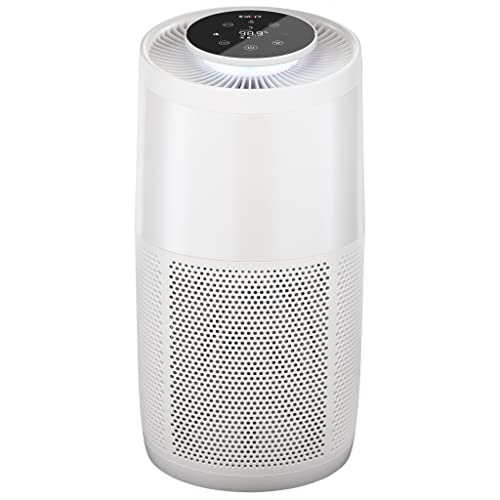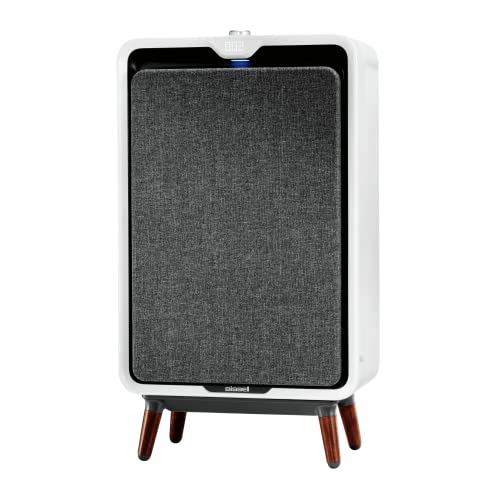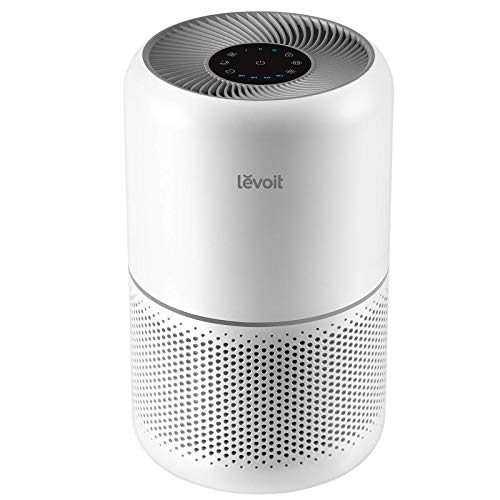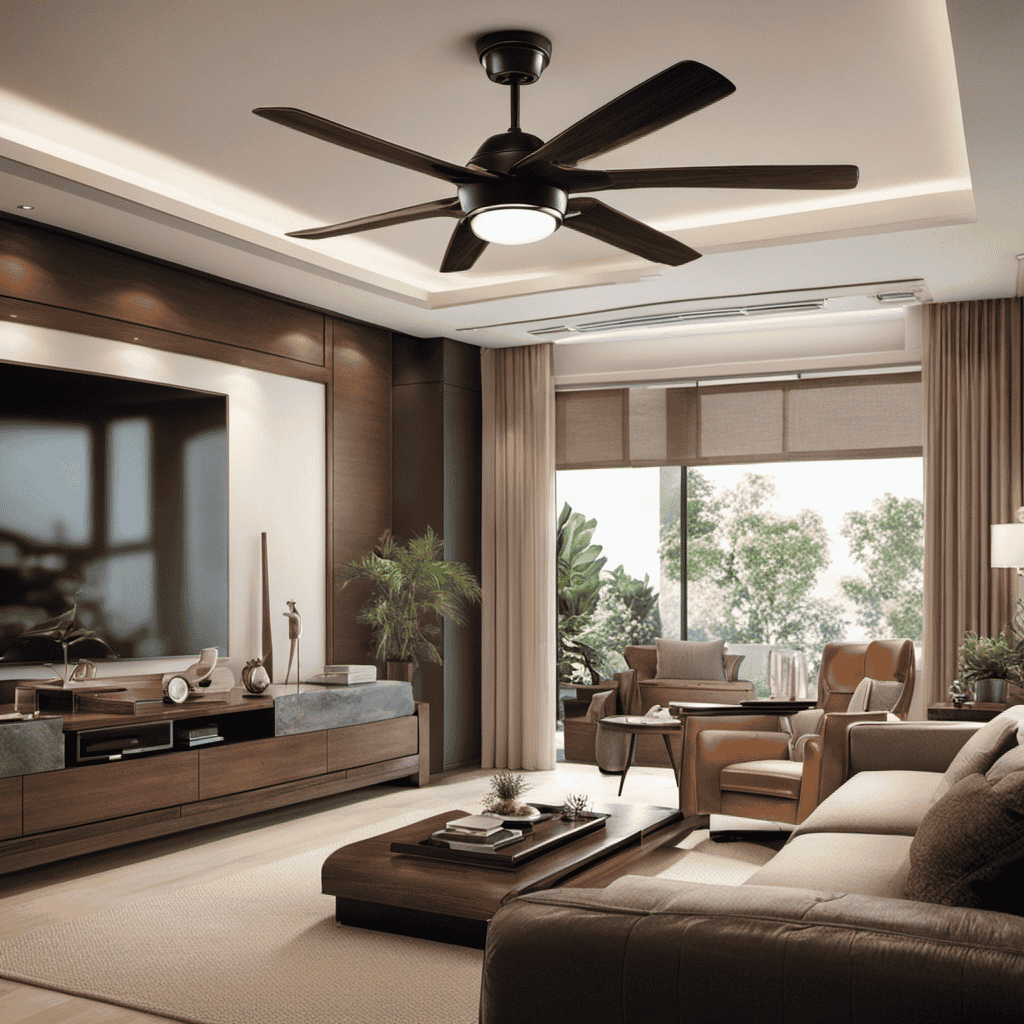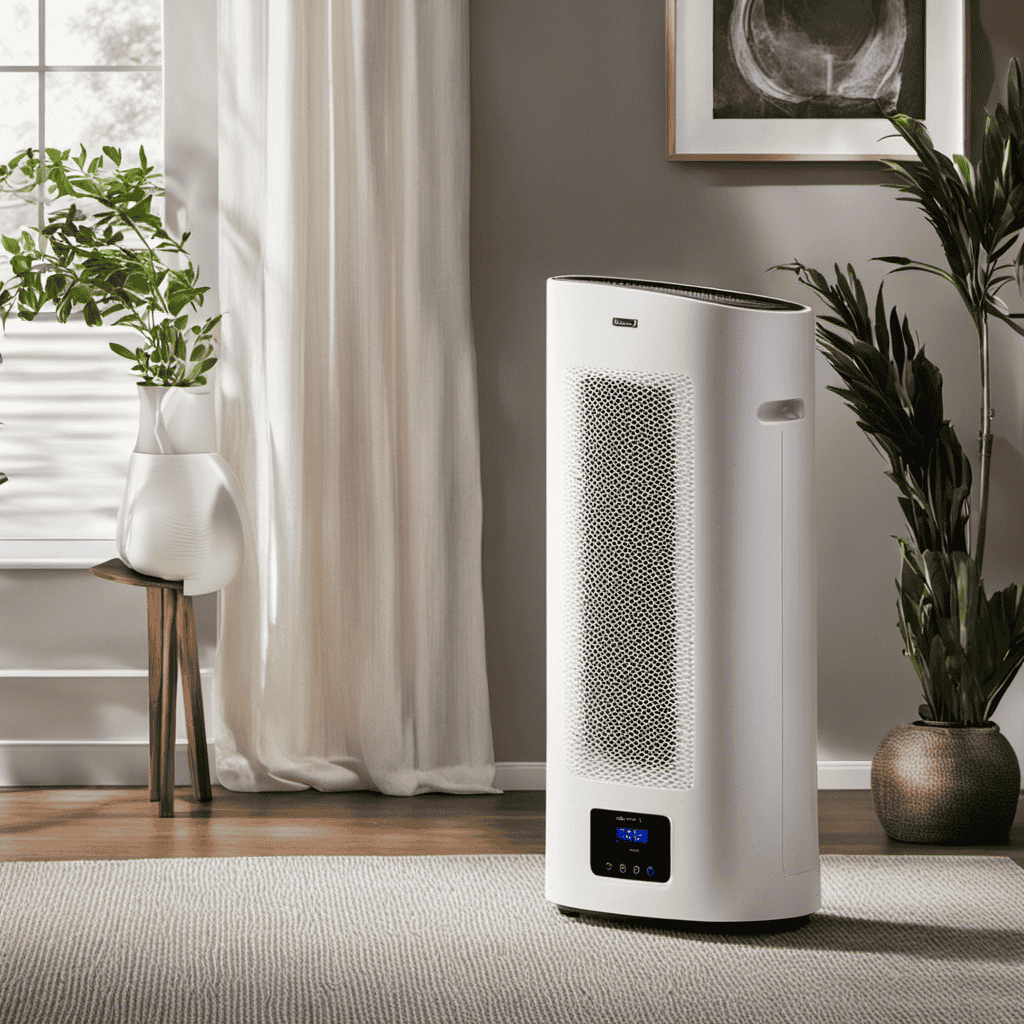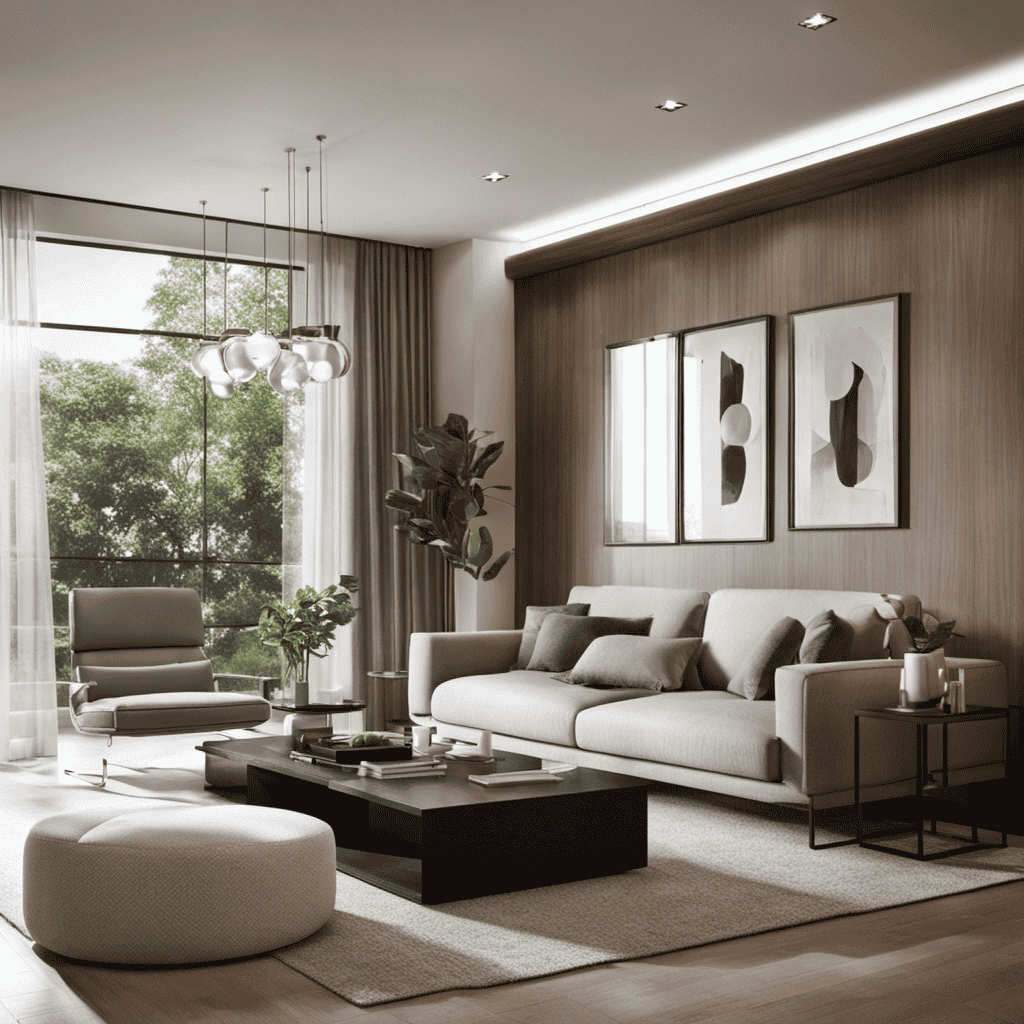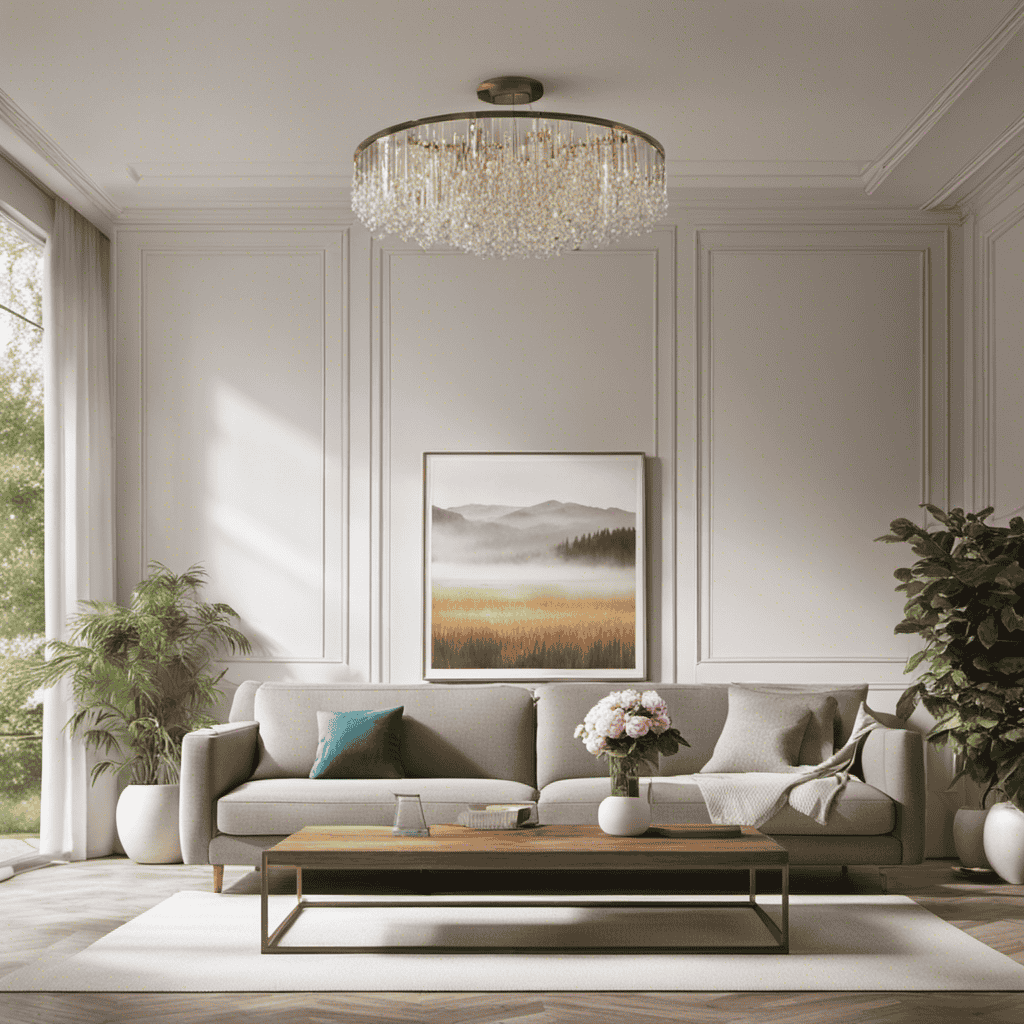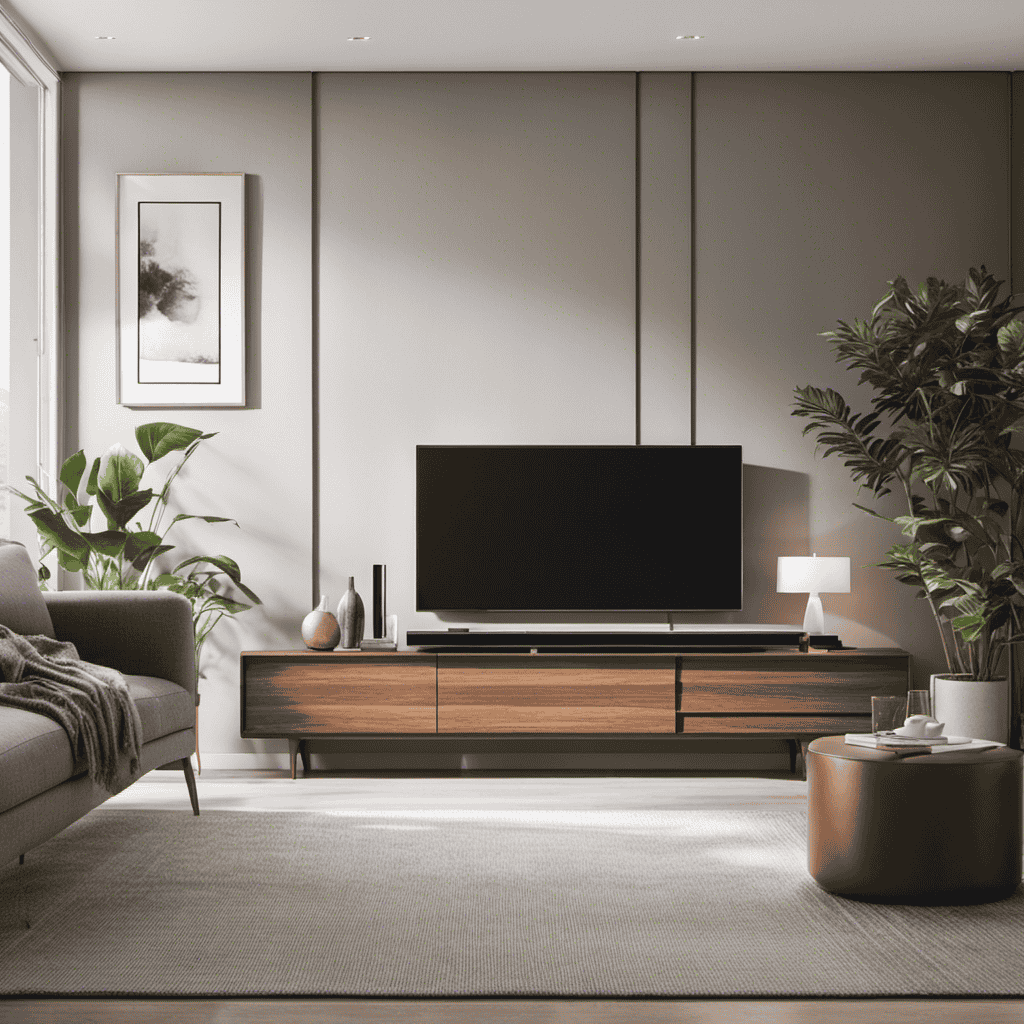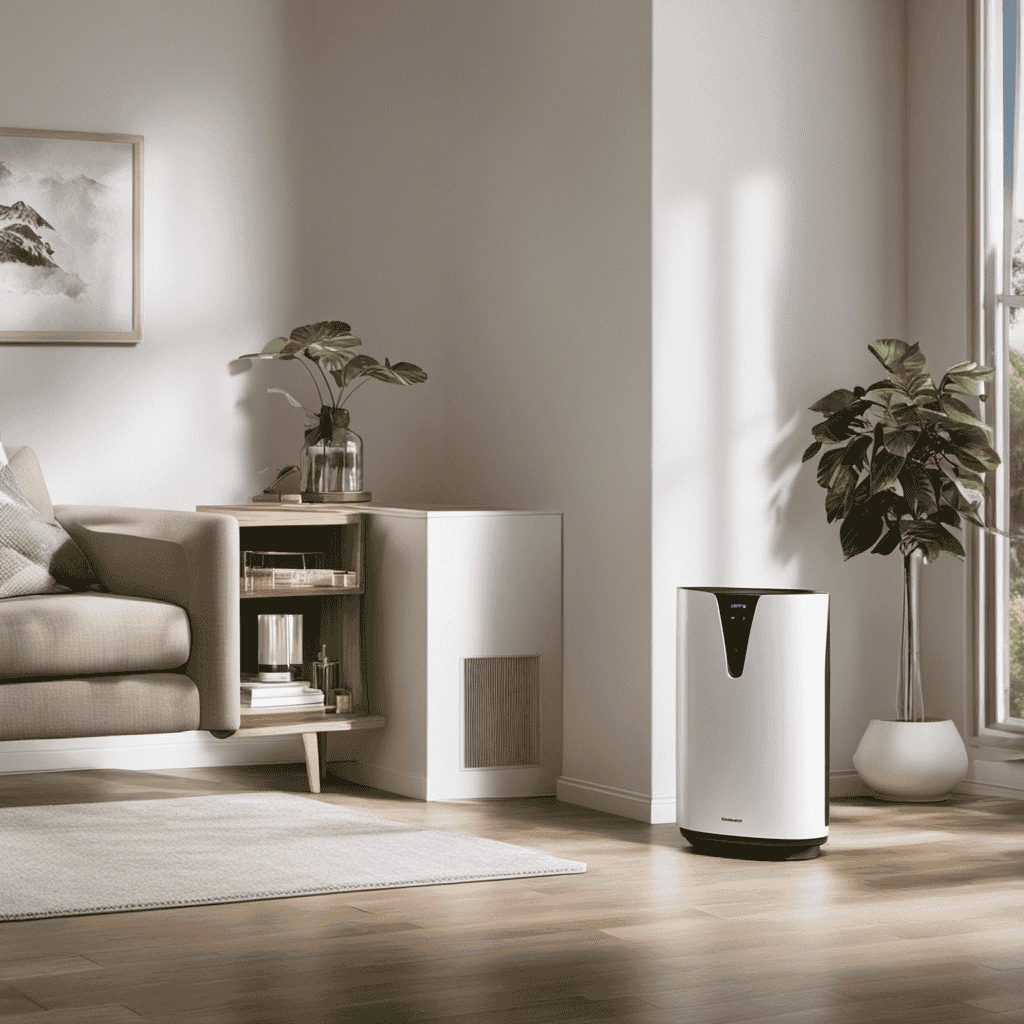Types of Air Purifiers
What Is Tye Difference Between an Air Purifier and a Hepa
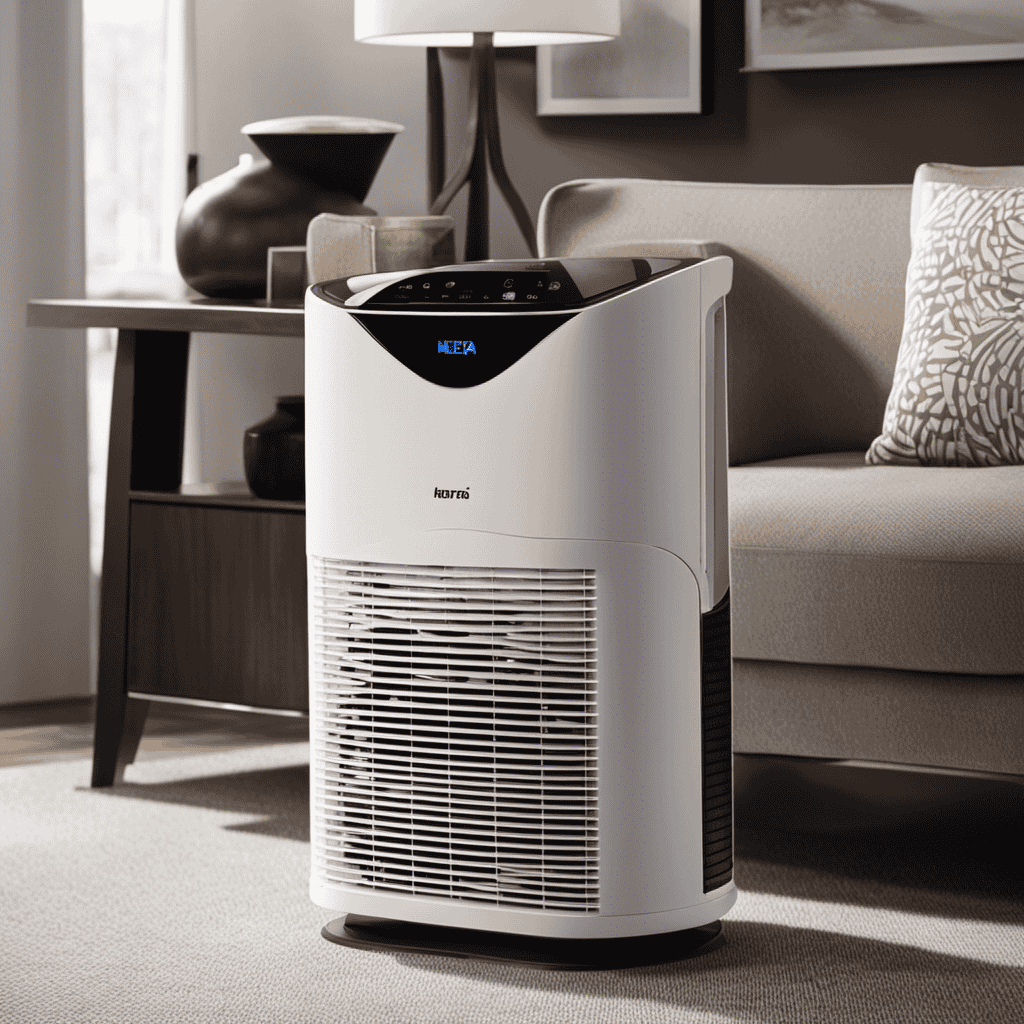
Ever pondered the distinction between an air purifier and a HEPA filter?
In this article, I will delve into the key features of air purifiers and the ins and outs of HEPA filters.
We will explore their pros and cons, how they clean the air, and ultimately, compare the two.
By the end, you’ll have a better understanding of the differences and be equipped to choose the right air purifier for your specific needs.
Key Takeaways
- HEPA filters capture particles as small as 0.3 microns and effectively remove common allergens and improve indoor air quality.
- Air purifiers have multiple filters and may include additional features like activated carbon filters for odor removal and UV-C lights for germ-killing capabilities.
- Both air purifiers and HEPA filters require routine maintenance, including filter replacement, for optimal performance.
- Both air purifiers and HEPA filters can provide health benefits by reducing allergens, eliminating unpleasant odors, and removing harmful pollutants from the air.
Key Features of Air Purifiers
If you’re looking for an air purifier, key features you should consider include a HEPA filter and the ability to remove allergens and pollutants from the air.
HEPA stands for High-Efficiency Particulate Air, and a HEPA filter is designed to capture particles as small as 0.3 microns. This makes it highly effective at removing common allergens like dust mites, pollen, pet dander, and mold spores.
However, it’s important to note that regular filter maintenance is necessary to ensure optimal performance. Over time, the filter can become clogged with trapped particles, reducing its effectiveness. Therefore, it’s crucial to regularly check and clean or replace the filter as recommended by the manufacturer.
Advances in air purifier technology have also introduced additional features like activated carbon filters for odor removal and UV-C lights for germ-killing capabilities.
Understanding HEPA Filters
Understanding HEPA filters can help improve the air quality in your home. HEPA stands for High Efficiency Particulate Air, and these filters are known for their ability to capture and trap small particles in the air.
Here are three key benefits of using HEPA filters in your air purifier:
-
Allergen Removal: HEPA filters can effectively remove common allergens such as pollen, pet dander, and dust mites from the air, providing relief for allergy sufferers.
-
Improved Indoor Air Quality: By capturing tiny particles as small as 0.3 microns, HEPA filters can help reduce pollutants in the air, making it cleaner and healthier to breathe.
-
Filter Longevity: Routine maintenance, such as regular filter replacement and cleaning, ensures optimal performance of your HEPA filter and extends its lifespan.
Understanding the benefits and maintenance of HEPA filters is crucial when considering an air purifier.
Now, let’s explore the pros and cons of air purifiers in more detail.
Pros and Cons of Air Purifiers
When considering the pros and cons of air purifiers, two key factors to examine are the filter effectiveness and energy consumption.
Filter effectiveness comparison allows us to assess how well different air purifiers remove pollutants from the air, helping us make informed decisions about which ones are most effective for our needs.
On the other hand, energy consumption analysis helps us understand the energy usage of air purifiers, which is crucial for both cost and environmental considerations.
Filter Effectiveness Comparison
To compare the filter effectiveness of an air purifier and a HEPA, you should consider their ability to remove particles from the air. When it comes to air purification, both options have their benefits and limitations. Here are three key factors to consider:
-
Filtration Efficiency: HEPA filters are known for their high efficiency in capturing particles as small as 0.3 microns, including dust, pollen, pet dander, and mold spores. Air purifiers with HEPA filters can effectively remove these airborne contaminants, improving indoor air quality.
-
Coverage Area: Air purifiers come in different sizes and have varied coverage areas. It is important to choose a purifier that can adequately clean the air in your specific room or space. HEPA filters are commonly found in larger air purifiers, making them suitable for larger rooms.
-
Maintenance and Cost: Air purifiers with HEPA filters require regular filter replacements to maintain optimal performance. It is essential to consider the cost and availability of replacement filters when comparing the long-term maintenance expenses.
Energy Consumption Analysis
The energy consumption of air purifiers and HEPA filters varies depending on the model and size. When it comes to energy efficiency, it is important to consider both the power consumption and the filtration efficiency.
Air purifiers with HEPA filters generally require more energy to operate compared to those with other types of filters. This is because HEPA filters are denser and require more air pressure to push the air through. However, HEPA filters are highly effective in removing particles as small as 0.3 microns, making them ideal for those with allergies or respiratory conditions.
In terms of cost comparison, it is essential to consider not only the initial purchase cost but also the long-term energy consumption. Investing in a more energy-efficient air purifier may lead to cost savings in the long run.
How Air Purifiers Clean the Air
Air purifiers use filters to remove contaminants from the air, improving indoor air quality. These devices are essential for maintaining a healthy living environment.
Here are three key benefits of using air purifiers:
-
Reduces Allergens: Air purifiers effectively capture and remove common allergens such as pollen, dust mites, pet dander, and mold spores. This helps alleviate allergy symptoms and provides relief for individuals with respiratory conditions.
-
Eliminates Odors: Air purifiers can eliminate unpleasant odors caused by cooking, pets, or smoke. They neutralize the odor-causing particles, leaving the air fresh and clean.
-
Enhances Overall Health: By removing harmful pollutants like volatile organic compounds (VOCs), bacteria, and viruses, air purifiers promote a healthier living environment. This can reduce the risk of respiratory infections and other health issues.
To ensure optimal performance, regular air purifier maintenance is necessary. This includes cleaning or replacing filters, checking the unit for any dust buildup, and following the manufacturer’s instructions.
Comparing Air Purifiers and HEPA Filters
When comparing air purifiers and HEPA filters, you’ll want to consider their effectiveness in removing allergens and pollutants from your indoor environment. Air purifiers are devices that work to clean the air by trapping and filtering out airborne particles such as dust, pollen, pet dander, and mold spores. On the other hand, HEPA filters are a type of filter used in some air purifiers that are designed to capture 99.97% of particles as small as 0.3 microns. To help you understand the key differences between air purifiers and HEPA filters, I’ve created a table below:
| Air Purifiers | HEPA Filters |
|---|---|
| Uses multiple filters to remove pollutants | Utilizes a single HEPA filter for filtration |
| Can include additional features like UV light or ionizers | Focuses solely on filtration |
| Requires regular maintenance such as filter replacement | Requires regular maintenance such as filter replacement |
| Can provide health benefits by improving air quality | Can provide health benefits by improving air quality |
In terms of air purifier maintenance, it’s important to follow the manufacturer’s instructions for cleaning and replacing filters. Regular maintenance ensures that your air purifier continues to effectively remove allergens and pollutants, maintaining clean air in your indoor environment. The health benefits of clean air are numerous, including improved respiratory health, reduced allergy symptoms, and better overall well-being. By investing in an air purifier or HEPA filter and properly maintaining it, you can enjoy the benefits of clean air and breathe easier in your home or office.
Choosing the Right Air Purifier for Your Needs
When it comes to choosing the right air purifier for your needs, there are several key points to consider.
First, filter efficiency comparison is crucial in determining how effectively the air purifier can remove airborne particles and pollutants.
Second, room size compatibility should be taken into account to ensure that the air purifier can adequately clean the air in the designated space.
Lastly, noise level consideration is important, as some air purifiers can be quite noisy, which may be a factor to consider for those who are sensitive to noise or plan to use the purifier in a bedroom or quiet space.
Filter Efficiency Comparison
The HEPA filter is more efficient at removing airborne particles than the standard air purifier. This is because HEPA filters are designed to capture particles as small as 0.3 microns, while standard air purifiers may only be able to capture larger particles.
Here are three reasons why the HEPA filter is superior in terms of filter efficiency:
-
Air quality measurements: HEPA filters have been proven to remove up to 99.97% of airborne particles, including dust, pollen, pet dander, mold spores, and even bacteria and viruses. This means that the air you breathe will be cleaner and healthier.
-
Maintenance requirements: While both types of air purifiers require regular maintenance, HEPA filters tend to last longer. Depending on the manufacturer’s recommendations, HEPA filters typically need to be replaced every 6 to 12 months, compared to standard air purifiers which may require filter changes more frequently.
-
Filter effectiveness: HEPA filters are highly effective at trapping even the smallest particles. Their dense filter media is designed to capture particles as small as 0.3 microns, making them ideal for people with allergies or respiratory conditions.
Room Size Compatibility
To determine if an air purifier is compatible with the size of your room, you should consider the Clean Air Delivery Rate (CADR) and the recommended room size provided by the manufacturer.
CADR is a measure of how quickly the air purifier can filter the air in a room. It is important to choose an air purifier with a CADR that matches or exceeds the size of your room.
The recommended room size provided by the manufacturer is also crucial because it takes into account factors such as ceiling height and ventilation. It is essential to follow these guidelines to ensure that the air purifier can effectively clean the air in your room.
Additionally, when comparing prices, it is important to consider the long-term costs of air purifier maintenance, such as filter replacements, to make an informed decision.
Noise Level Consideration
When it comes to choosing an air purifier or a HEPA filter, one important factor to consider is the noise level. As someone who values a peaceful environment, I prefer appliances that operate silently. Luckily, there are soundproofing solutions available for both air purifiers and HEPA filters to minimize noise disturbances in your home.
Here are three soundproofing solutions you can consider:
-
Acoustic Panels: These panels are designed to absorb sound waves and reduce echo, making them an effective solution for reducing noise from air purifiers or HEPA filters.
-
Soundproof Curtains: These curtains are made with special materials that block sound waves from entering or leaving a room. They can be used to create a barrier between the noise source and the rest of your living space.
-
Noise-Canceling Devices: Certain devices, like white noise machines or noise-canceling headphones, can help mask the sound of an air purifier or HEPA filter, allowing you to enjoy a quiet environment.
Frequently Asked Questions
How Much Noise Do Air Purifiers Typically Make?
Air purifiers typically make varying levels of noise depending on the model and fan speed. Noise levels are measured in decibels (dB), with quieter models ranging from 20-50 dB and louder ones reaching up to 70 dB.
Can Air Purifiers Remove Unpleasant Odors From the Air?
Yes, air purifiers can effectively remove unpleasant odors from the air. They are designed to capture and neutralize particles and chemicals that cause odors, improving indoor air quality for pets and overall comfort.
Do Air Purifiers Require Regular Maintenance and Filter Replacement?
Air purifiers require regular maintenance and filter replacement to ensure optimal performance. Regular cleaning of the unit and replacing the filters as recommended by the manufacturer will help maintain clean and fresh air in your space.
Can Air Purifiers Help Reduce Symptoms of Allergies or Asthma?
Air purifiers can help reduce symptoms of allergies or asthma by improving indoor air quality. They remove airborne pollutants, such as dust, pollen, and pet dander, which can trigger respiratory issues. Regular use and maintenance are essential for optimal effectiveness.
Are Air Purifiers Effective in Removing Viruses and Bacteria From the Air?
Air purifiers are effective in reducing airborne pollutants like viruses and bacteria. They are often compared to face masks for virus protection, but air purifiers can provide continuous filtration for larger spaces.
How Does the Pore Size of a Hepa Type Air Purifier Compare to a Regular Air Purifier?
When comparing the pore size of a regular air purifier to a Febreze HEPA type air purifier, the difference is significant. The Febreze HEPA type pore size is much smaller than that of a regular air purifier, allowing it to capture and trap smaller particles, making it more effective in purifying the air in your home.
Conclusion
After thoroughly researching air purifiers and HEPA filters, I can confidently conclude that both are effective in improving indoor air quality.
Air purifiers, with their various features, can remove a wide range of pollutants, while HEPA filters are known for their exceptional ability to capture even the tiniest particles.
While both have their pros and cons, the choice ultimately depends on individual needs. However, one thing is certain: using either of these devices will make your indoor air so clean, it’ll feel like you’re breathing in pure mountain air.
At Aero Guardians, where every piece of information aims to make the world a breath fresher, Samuela’s role as an author has been nothing short of transformative. With a penchant for weaving stories around the science of air purification, Samuela has enriched the platform with content that is both enlightening and captivating.
Types of Air Purifiers
Rainmate Air Purifier How to Use

I have always had issues with allergies and poor air quality in my house, but everything has been different since I found the Rainmate Air Purifier.
It’s like having a breath of fresh air indoors!
In this article, I’ll guide you through the simple steps of using the Rainmate Air Purifier to maximize its effectiveness. From unboxing to understanding its components, I’ll provide you with all the information you need to create a healthier and cleaner environment in your home.
Let’s get started!
Key Takeaways
- The Rainmate Air Purifier has a sleek and modern design, with sturdy and well-designed packaging.
- The setup process involves pouring water into the water basin, adding fragrance if desired, and securely closing the basin before plugging in and turning on the purifier.
- It is important to consider placement and location of the purifier, avoiding corners or walls and positioning it at least 3 feet away from furniture or objects.
- The purifier offers different modes, including Normal Mode for dust and allergen removal, Sleep Mode for nighttime use with minimized noise, and Boost Mode for intense air purification.
Unboxing the Rainmate Air Purifier
First, you’ll want to unbox the Rainmate Air Purifier to get started.
The unboxing experience of the Rainmate Air Purifier is straightforward and efficient. The packaging is sturdy and well-designed, ensuring the safety of the product during transit.
As I opened the box, I was immediately impressed by the sleek and modern design of the purifier. The unit itself is compact and lightweight, making it easy to move around and place in any room. The first impressions were positive, as the purifier looked aesthetically pleasing and high-quality.
The package also included a user manual, which provided clear instructions on how to assemble and operate the purifier.
Overall, the unboxing experience of the Rainmate Air Purifier was smooth and left me excited to start using it.
Understanding the Different Components of the Rainmate Air Purifier
Next, you’ll want to familiarize yourself with the various components of the Rainmate so you can make the most of its air purifying capabilities. Here are the key components you should know:
-
The Water Basin: This is where you pour water to create the mist that helps purify the air. Make sure to fill it up to the recommended level for optimal performance.
-
The Motor Unit: This is the main part of the Rainmate that powers the air purifying process. It’s important to understand how it operates and how to maintain it properly.
-
The Fragrance Tray: This component allows you to add your preferred fragrance to the mist, enhancing the air purifying experience. Just make sure to use compatible fragrances recommended by the manufacturer.
When it comes to finding replacement parts, it’s crucial to refer to the manufacturer’s guidelines or contact their customer support. Additionally, understanding the warranty coverage is essential to know what parts are covered and for how long. Don’t hesitate to reach out to the manufacturer for any inquiries regarding replacements or warranty information.
Setting Up Your Rainmate Air Purifier
To set up your Rainmate, you’ll need to follow these simple steps. First, ensure that you have all the necessary accessories for optimal performance. When choosing accessories, consider the Rainmate Fragrance Pack, which includes a variety of scents to suit your preferences. Next, fill the water basin with clean water up to the recommended level. Then, add a few drops of the Rainmate Fragrance Oil to the water for a pleasant aroma. Place the water basin back onto the unit and securely close it. Finally, plug in your Rainmate and turn it on to enjoy fresh, purified air. For maintenance tips, regularly clean the water basin and replace the fragrance oil as needed. Refer to the table below for a summary of the steps.
| Steps | Description |
|---|---|
| 1 | Choose accessories |
| 2 | Fill water basin |
| 3 | Add fragrance oil |
| 4 | Close water basin |
| 5 | Plug in and turn on |
Choosing the Right Location for Your Rainmate Air Purifier
When it comes to optimizing the performance of your Rainmate air purifier, finding the right location is crucial.
To ensure maximum effectiveness, it is important to consider factors such as airflow patterns, room size, and potential sources of pollutants.
Optimal Placement for Rainmate
For optimal performance, place your Rainmate air purifier in an area with good air circulation. Here are three key considerations to keep in mind when finding the best location for your Rainmate and optimizing air circulation:
-
Avoid placing your Rainmate in a corner or against a wall. This can hinder air flow and reduce its effectiveness in purifying the surrounding air.
-
Position the Rainmate at least 3 feet away from furniture or other objects. This allows for proper air circulation and prevents obstruction of the intake and output vents.
-
Place the Rainmate on an elevated surface, such as a table or shelf. This helps to ensure that the purified air is distributed evenly throughout the room.
By following these placement guidelines, you can maximize the air purifying capabilities of your Rainmate and create a healthier living environment.
In the next section, we will explore how to find a suitable location for your air purifier based on room size and specific needs.
Finding Suitable Air Location
Now that we know the optimal placement for the Rainmate air purifier, let’s discuss the importance of finding a suitable air location.
Proper air purifier placement is crucial in maximizing its effectiveness and reaping the benefits it offers.
When searching for the best location, consider placing the air purifier in a central area of the room. This allows for better air circulation and coverage throughout the space. Additionally, avoid placing the purifier near obstacles like furniture or curtains, as these can impede airflow and hinder its performance.
By finding a suitable air location, you can ensure that the air purifier effectively filters and purifies the surrounding air. This leads to improved indoor air quality, reduced allergens and pollutants, and a healthier living environment for you and your family.
Don’t underestimate the impact of proper air purifier placement – it can make all the difference in achieving clean and fresh air.
Powering On and Off the Rainmate Air Purifier
To turn on the Rainmate air purifier, simply press the power button. It is located on the front panel of the device. The power button is easily distinguishable as it is labeled with a power symbol.
When powering on the Rainmate, make sure it is plugged into a functioning electrical outlet. If the device fails to turn on, there are a few troubleshooting steps you can try:
-
Check the power cord: Ensure that the power cord is securely connected to both the Rainmate and the electrical outlet.
-
Test the outlet: Plug another device into the same outlet to verify if it is working properly.
-
Contact customer support: If the above steps do not resolve the issue, reach out to the Rainmate customer support team for further assistance.
Remember to always follow the manufacturer’s instructions and safety guidelines when operating the Rainmate air purifier.
Adjusting the Speed and Intensity of the Rainmate Air Purifier
You can easily adjust the speed and intensity of the Rainmate by turning the dial located on the front panel. This feature allows you to customize the airflow and purification level to suit your preferences and the specific needs of your environment.
By adjusting the fan speed, you can increase or decrease the amount of air circulation generated by the Rainmate. This is particularly useful if you desire a stronger airflow or prefer a quieter operation.
In addition, controlling the purification intensity enables you to fine-tune the effectiveness of the Rainmate in removing airborne pollutants and improving air quality.
With these adjustable settings, you have full control over the performance of your Rainmate air purifier. Understanding the different modes of the Rainmate will further enhance your experience and maximize the benefits of this powerful air purifier.
Understanding the Different Modes of the Rainmate Air Purifier
Understanding the different modes of the Rainmate can enhance your experience and maximize the benefits of this powerful device. The Rainmate air purifier offers three modes that cater to different needs and preferences:
-
Normal Mode: This mode operates at a medium speed, providing a balanced air purification performance. It effectively removes dust, pollen, and other allergens from the air, creating a cleaner and healthier environment.
-
Sleep Mode: Designed for nighttime use, this mode operates at a lower speed to minimize noise and disturbance. It ensures a peaceful and uninterrupted sleep while still purifying the air, so you can wake up feeling refreshed and revitalized.
-
Boost Mode: For times when you need a quick and intense air purification, this mode operates at a higher speed. It tackles strong odors, smoke, and other pollutants with maximum efficiency, leaving your space smelling fresh and clean.
Using the Aromatherapy Feature of the Rainmate Air Purifier
Explore the aromatic benefits of the Rainmate’s aromatherapy feature to create a soothing and relaxing environment in your space.
The Rainmate air purifier is not only effective in purifying the air but also offers the added benefit of aromatherapy. By using essential oils with the Rainmate, you can enhance the ambiance of your surroundings and promote a sense of calm and well-being.
The aromatherapy feature of the Rainmate allows for easy diffusion of essential oils into the air, providing a natural and therapeutic fragrance throughout your space. The benefits of aromatherapy with the Rainmate air purifier include reducing stress, improving sleep quality, and enhancing mood.
With its versatile functionality, the Rainmate air purifier is a valuable tool in creating a healthier and more pleasant environment for both your physical and mental well-being.
Maintaining and Cleaning Your Rainmate Air Purifier
Now that we’ve discussed how to use the aromatherapy feature of the Rainmate Air Purifier, it’s important to know how to properly maintain and clean this device. Follow these cleaning instructions and maintenance tips to ensure the longevity and efficiency of your Rainmate Air Purifier:
- Regularly clean the water basin and remove any debris or buildup to prevent clogging and optimize air circulation.
- Replace the water basin and Power Head Assembly filters according to the manufacturer’s recommendations to maintain optimal performance.
- Clean the exterior of the unit with a soft, damp cloth and mild detergent to remove any dust or dirt.
Replacing the Water and Fragrance in the Rainmate Air Purifier
To maintain optimal performance, I regularly replace the water and fragrance in my Rainmate Air Purifier. Replacing the water filter is an important step in keeping the air purifier functioning effectively. It is recommended to replace the water filter every three to six months, or when it becomes discolored or dirty. This ensures that the purifier is able to efficiently remove impurities from the air.
When choosing a fragrance oil, it is essential to select one that is compatible with the Rainmate Air Purifier. The fragrance oil should be specifically designed for use with the purifier to avoid any damage or malfunction. It is also important to follow the manufacturer’s instructions for adding the fragrance oil to the purifier to ensure proper usage and maintenance.
Troubleshooting Common Issues With the Rainmate Air Purifier
If you’re experiencing any issues with your Rainmate Air Purifier, there are some common troubleshooting steps you can try. Here are three tips to help you resolve common problems:
-
Check the power source: Make sure the Rainmate is plugged in securely and the power outlet is functioning properly. If the purifier is not turning on, try plugging it into a different outlet to rule out any electrical issues.
-
Clean the unit: Over time, dust and debris can accumulate in the Rainmate, affecting its performance. Turn off the purifier and remove the water basin. Clean the basin, fan, and other components with a soft, damp cloth. Ensure all parts are dry before reassembling.
-
Change the fragrance: If the scent emitted by the Rainmate is weak or unpleasant, it may be time to replace the fragrance. Follow the manufacturer’s instructions to add a new fragrance cartridge or essential oils to enhance the air purification experience.
Maximizing the Effectiveness of Your Rainmate Air Purifier
To make sure you get the most out of your Rainmate Air Purifier, try placing it in a central location in the room. This will allow for optimal air circulation and maximize the effectiveness of the purifier in improving air quality.
When placed centrally, the purifier can more efficiently remove pollutants and allergens from the air, ensuring that you and your family breathe in clean and fresh air.
Additionally, it is important to regularly clean and maintain your Rainmate Air Purifier to ensure its peak performance. By keeping the purifier clean and replacing the filters as recommended, you can further enhance its effectiveness in removing particles from the air.
Now, let’s explore some helpful tips for using your Rainmate Air Purifier in different seasons.
Tips for Using Your Rainmate Air Purifier in Different Seasons
During different seasons, it’s important to adjust the settings on your Rainmate Air Purifier to accommodate changing air quality needs. Here are some tips for using your Rainmate Air Purifier effectively throughout the year:
-
Spring: As pollen levels rise during spring, set your Rainmate Air Purifier on a higher fan speed to capture and remove airborne allergens. Regularly clean the unit’s water basin to prevent the buildup of mold or bacteria.
-
Summer: In hot and humid weather, adjust the settings to a lower fan speed to maintain a comfortable indoor environment. Ensure that the purifier is placed away from direct sunlight to prevent overheating.
-
Winter: During the colder months, indoor air tends to be drier. Set your Rainmate Air Purifier on a lower fan speed to add moisture back into the air. Remember to refill the water basin frequently to maintain optimal humidity levels.
Understanding the Health Benefits of the Rainmate Air Purifier
Understanding the health benefits of the Rainmate Air Purifier can help you make informed decisions about its use. When comparing the Rainmate Air Purifier to other air purifiers on the market, several key advantages stand out. Firstly, the Rainmate Air Purifier uses water to trap and remove contaminants from the air, resulting in cleaner and fresher air. This unique feature sets it apart from traditional filters that only capture particles. Additionally, the Rainmate Air Purifier acts as a humidifier, adding moisture to the air, which can alleviate dryness and improve overall respiratory health. The table below highlights some of the benefits of using a Rainmate Air Purifier compared to other air purifiers:
Benefit Rainmate Air Purifier Other Air Purifiers Traps Contaminants ✓ ✗ Adds Moisture to Air ✓ ✗ Improves Respiratory Health ✓ ✗
By understanding these advantages, you can confidently choose the Rainmate Air Purifier for a healthier living environment.
As we delve into frequently asked questions about using the Rainmate Air Purifier, you’ll gain further insights into its optimal use and maintenance.
Frequently Asked Questions About Using the Rainmate Air Purifier
Get answers to your most common questions about using the Rainmate Air Purifier and improve your experience with this innovative device.
-
How often should I clean the Rainmate Air Purifier?
It is recommended to clean the Rainmate Air Purifier at least once a month to ensure optimal performance and longevity. -
How do I clean the Rainmate Air Purifier?
To clean the Rainmate Air Purifier, simply remove the water basin and rinse it with warm water. Gently wipe the inside of the unit with a soft cloth. Allow all components to dry completely before reassembling. -
When should I replace the filters?
The Rainmate Air Purifier does not use filters, as it operates using water to purify the air. However, regular maintenance includes cleaning the water basin and checking for any debris that may clog the unit.
Frequently Asked Questions
Can the Rainmate Air Purifier Remove Pet Dander and Allergens From the Air?
Yes, the Rainmate air purifier effectively removes pet dander and allergens from the air. I have personally experienced the benefits of this device, as it significantly reduces the presence of these particles in my home.
Is It Safe to Use the Rainmate Air Purifier All Night While Sleeping?
Yes, it is safe to use the Rainmate Air Purifier all night while sleeping. It is effective for people with asthma or allergies, as it removes pet dander and allergens from the air, providing potential health benefits.
How Often Should I Replace the Water and Fragrance in the Rainmate Air Purifier?
I replace the water and fragrance in the Rainmate Air Purifier regularly to ensure optimal performance. It’s important to clean the unit regularly to maintain its effectiveness and enjoy the benefits of using it.
Can the Rainmate Air Purifier Help With Eliminating Odors From Cooking or Smoking?
Yes, the Rainmate Air Purifier can effectively eliminate cooking odors and reduce smoke odor. It uses advanced technology to filter and neutralize airborne particles, leaving your home smelling fresh and clean.
Does the Rainmate Air Purifier Require Any Regular Maintenance Besides Cleaning?
Regular maintenance is essential for any device, and the Rainmate Air Purifier is no exception. Besides routine cleaning, this purifier requires no additional upkeep. It’s a hassle-free solution for maintaining clean and fresh air in your home.
What are the differences between an Ozone Air Purifier and a Rainmate Air Purifier?
When looking to improve indoor air quality, learning about ozone air purifiers versus Rainmate air purifiers is crucial. Ozone air purifiers emit ozone to neutralize odors and kill bacteria. Rainmate air purifiers, on the other hand, use water and essential oils to freshen the air without producing ozone.
Conclusion
After extensively researching and testing the Rainmate Air Purifier, I must admit that I am thoroughly impressed.
This little device, with its simple setup and powerful purification capabilities, has completely transformed the air quality in my home.
It’s ironic how something so unassuming can have such a profound impact on our health and well-being.
The Rainmate Air Purifier is a game-changer, providing us with cleaner air to breathe and a sense of peace knowing that we are taking care of our respiratory health.
Don’t underestimate the power of this compact machine – it’s a true gem in the realm of air purification.
Types of Air Purifiers
Ionic Pro Air Purifier How It Works

Being a fan of technology, I was fascinated by the complex operations of the Ionic Pro Air Purifier. This cutting-edge device merges ionization power with a sophisticated filtration system to provide unmatched air purification.
By removing airborne particles, allergens, and even mold spores, it ensures a breath of fresh, clean air. With its silent operation and energy efficiency, it is truly a must-have for those seeking relief from asthma and allergies.
Let’s delve into the fascinating world of the Ionic Pro Air Purifier and discover how it works.
Key Takeaways
- Ionic Pro Air Purifier utilizes advanced filtration systems and technologies such as ionization, electrostatic precipitation, and UV-C light to enhance air purification.
- It effectively eliminates odors, reduces dust and pollen, and filters out dust particles and pollen.
- The air purifier destroys bacteria and viruses, ensuring the purification of indoor air and reducing indoor pollutants.
- Negative ions generated by the purifier help reduce airborne allergens, improve air quality, and increase oxygen levels, while also reducing mold spores.
Ionization Process
The ionization process creates negative ions that attach to airborne particles, effectively neutralizing them. This process is the key mechanism behind the air purification capabilities of the Ionic Pro Air Purifier.
When the device is turned on, it releases negative ions into the air. These ions are attracted to positively charged particles, such as dust, pollen, and smoke, causing them to become heavy and fall to the ground. This helps to remove these particles from the air, reducing the overall particle count and improving indoor air quality.
The ionization benefits of the Ionic Pro Air Purifier include the ability to capture and remove small particles that may not be caught by traditional filters. However, it is important to note that there are some safety concerns associated with ionization. High levels of negative ions in the air can potentially cause respiratory irritation and other health issues in sensitive individuals.
Therefore, it is crucial to use the Ionic Pro Air Purifier in accordance with the manufacturer’s instructions and to regularly clean and maintain the device to ensure its safe and effective operation.
Advanced Filtration System
Equipped with an advanced filtration system, this Ionic Pro Air Purifier effectively removes pollutants from the air. The filtration techniques used in this purifier are designed to provide advanced purification, ensuring that the air you breathe is clean and fresh. The system consists of multiple filters that work together to capture and eliminate various airborne particles. Let’s take a closer look at these filters:
Filter Type Function Pre-Filter Traps larger particles such as dust and pet dander Carbon Filter Absorbs odors and harmful gases True HEPA Filter Captures microscopic particles like pollen and mold spores
Each filter plays a crucial role in purifying the air, targeting specific pollutants. By utilizing this multi-stage filtration system, the Ionic Pro Air Purifier ensures thorough purification, providing you with cleaner and healthier air to breathe. Now, let’s delve into the next section to explore the removal of airborne particles.
Removal of Airborne Particles
The particle filtration process plays a crucial role in improving air quality by removing airborne particles. This process involves the use of filters that are designed to capture and trap particles of various sizes, including dust, pollen, pet dander, and smoke.
Particle Filtration Process
Our Ionic Pro Air Purifier uses a particle filtration process to clean the air in your home. Through continuous advancements in purification technology, we have developed a highly efficient system for airborne contaminant removal.
The process begins with the air being drawn into the purifier through an intake vent. The air then passes through a pre-filter, which captures larger particles such as dust and pet dander.
Next, the air moves through an electrostatically charged grid, where the charged particles are attracted to oppositely charged plates. This stage effectively removes smaller particles like pollen and mold spores.
Air Quality Improvement
To improve the air quality in your home, start by regularly cleaning and dusting your living space. This will help remove any accumulated dust, allergens, and pollutants. Additionally, using an air purifier can further enhance air quality by effectively capturing and eliminating airborne particles. When choosing an air purifier, it is important to consider its effectiveness in air pollution control. Here is a comparison table to help you understand the different types of air purifiers and their capabilities:
Type of Air Purifier Description Effectiveness HEPA Filter Uses a dense filter to trap particles Highly effective in removing allergens and pollutants Activated Carbon Filter Absorbs odors and chemicals Effective in controlling volatile organic compounds (VOCs) UV-C Light Emits ultraviolet light to kill bacteria and viruses Effective in eliminating germs and microorganisms
Elimination of Allergens
When it comes to eliminating allergens from the air, there are several effective methods available. Understanding these methods and their health benefits is crucial for maintaining a clean and healthy indoor environment.
One method that stands out is the use of ionic technology, which offers numerous advantages in removing allergens and improving air quality.
Allergen Removal Methods
The Ionic Pro Air Purifier uses various methods to remove allergens from the air. Its effectiveness lies in its ability to target common allergens found in indoor environments. Here are the key methods it employs:
-
Electrostatic precipitation: The purifier uses charged plates to attract and capture airborne particles, such as dust, pollen, and pet dander.
-
Negative ion generation: The device emits negatively charged ions that attach to positively charged allergens, causing them to become heavy and fall out of the air.
-
UV-C light technology: The purifier utilizes ultraviolet light to destroy bacteria and viruses, reducing the risk of respiratory infections.
-
Carbon filter: This layer helps to neutralize odors and remove harmful volatile organic compounds (VOCs) from the air.
-
Ozone generation: In some models, the purifier produces ozone, which can react with and eliminate certain pollutants.
Health Benefits Explained
One of the health benefits of using the Ionic Pro Air Purifier is the reduction of allergens in the indoor environment. This innovative air purification technique employs ionization to remove harmful particles, such as pollen, dust mites, pet dander, and mold spores, from the air we breathe. By emitting negative ions into the air, the Ionic Pro Air Purifier charges these particles, causing them to stick to positively charged collection plates within the device. This process effectively removes up to 99% of allergens, providing cleaner, fresher air for improved respiratory health.
To better understand the impact of the Ionic Pro Air Purifier on respiratory health, let’s take a closer look at the table below:
Allergens Reduction Rate Pollen 99% Dust Mites 99% Pet Dander 99% Mold Spores 99%
As you can see, the Ionic Pro Air Purifier is highly effective in reducing allergens that can trigger respiratory issues. By eliminating these harmful particles, it can help alleviate symptoms for individuals with allergies or asthma, promoting better overall respiratory health.
Ionic Technology Advantages
By emitting negative ions, the Ionic Pro Air Purifier improves the quality of indoor air. This innovative technology offers several advantages and health benefits.
-
Enhanced air purification: Ionic technology effectively removes airborne particles, such as dust, pollen, and pet dander, from the air, resulting in cleaner and fresher indoor air quality.
-
Odor elimination: The negative ions produced by the purifier neutralize odors, eliminating unpleasant smells caused by cooking, pets, or smoke.
-
Reduced allergens: By capturing and removing allergens from the air, the Ionic Pro Air Purifier helps alleviate symptoms for individuals with allergies or asthma.
-
Improved respiratory health: With cleaner air, respiratory conditions can be improved, leading to easier breathing and reduced respiratory discomfort.
-
Increased overall well-being: Breathing cleaner air can have positive effects on overall health, improving sleep, concentration, and reducing fatigue.
Overall, the advantages of ionic technology in air purifiers provide significant health benefits, making them an excellent choice for improving indoor air quality.
Odor Control Technology
Odor control technology in the Ionic Pro Air Purifier helps eliminate unwanted smells by using advanced filtration systems and ionization processes. Unlike traditional air fresheners that simply mask odors, the Ionic Pro Air Purifier tackles the source of the problem, effectively neutralizing and eliminating unpleasant smells.
One of the key odor control methods employed by the Ionic Pro Air Purifier is the use of activated carbon filters. These filters are highly effective in trapping and removing odorous particles and gases from the air. Additionally, the purifier utilizes ionization technology to charge particles in the air, causing them to stick to surfaces or be caught by the filters.
To further emphasize the effectiveness of the Ionic Pro Air Purifier in odor control, consider the following table:
Odor Control Method Effectiveness Activated Carbon Filters High Ionization Technology Excellent
Reduction of Dust and Pollen
When it comes to creating a healthy indoor environment, one of the key factors to consider is the reduction of airborne allergens. Airborne allergens can include dust, pollen, pet dander, and mold spores, all of which can trigger allergies and respiratory issues.
To effectively combat these allergens, it is important to have an air purifier that is equipped with advanced filtration technology, specifically designed to remove these particles from the air.
Airborne Allergen Removal
The ionic pro air purifier is known for its high air purifying efficiency and its ability to improve respiratory health. Here are five reasons why it is highly effective in removing airborne allergens:
- It utilizes negative ions to attract and neutralize allergens in the air.
- It releases clean, purified air into the environment.
- It reduces the presence of allergens such as pollen, pet dander, and dust mites.
- It helps alleviate symptoms of respiratory conditions like asthma and allergies.
- It creates a healthier indoor environment by removing harmful particles from the air.
With its ability to effectively remove airborne allergens, the ionic pro air purifier has a significant impact on improving respiratory health.
However, in addition to allergen removal, the purifier also has a crucial role in filtering dust particles from the air.
Dust Particle Filtration
One of the benefits of using the ionic pro air purifier is that it effectively filters out dust particles from the air. Dust particle removal is a crucial aspect of air purification methods, as these particles can cause respiratory issues and reduce indoor air quality.
The ionic pro air purifier utilizes an advanced technology called electrostatic precipitation to capture and remove dust particles from the air. This process involves charging the dust particles with negative ions and then attracting them to a positively charged collection plate. As the air passes through the purifier, the charged particles are trapped, resulting in cleaner air.
The ionic pro air purifier is highly efficient at dust particle removal, making it an excellent choice for those looking to improve the air quality in their homes or offices.
Pollen Reduction Technology
When it comes to seasonal allergies, one of the most common triggers is pollen. As someone who suffers from seasonal allergies, I understand the importance of finding effective pollen prevention methods for relief. Here are some key strategies to consider:
-
Keep windows closed: By keeping windows closed, you can prevent pollen from entering your home and exacerbating your allergies.
-
Use air purifiers: Investing in an air purifier, such as the Ionic Pro Air Purifier, can help remove pollen particles from the air, providing you with clean and allergen-free air to breathe.
-
Clean regularly: Regularly cleaning your home can help reduce pollen buildup on surfaces, minimizing the chances of exposure.
-
Wear a mask: When spending time outdoors, wearing a mask can help filter out pollen particles, reducing your risk of allergies.
-
Track pollen levels: Staying informed about pollen levels in your area can help you plan your outdoor activities accordingly, avoiding high pollen days for better seasonal allergy relief.
Destruction of Bacteria and Viruses
To destroy bacteria and viruses, the ionic pro air purifier uses its advanced technology to release negatively charged ions that neutralize harmful microorganisms in the air, helping you breathe cleaner and healthier air. This process is essential for the deactivation of pathogens and the overall air disinfection.
When the ionic pro air purifier is turned on, it emits these negatively charged ions into the air. These ions attach themselves to the positively charged particles such as bacteria and viruses. Once attached, the ions neutralize the microorganisms, rendering them inactive and unable to cause harm. As a result, the air becomes free from these harmful pathogens, creating a safer and healthier environment for you and your family.
With the bacteria and viruses effectively neutralized, the subsequent section will explore how the ionic pro air purifier further purifies the indoor air.
Purification of Indoor Air
Clean air is essential for maintaining a healthy indoor environment, as it offers numerous benefits.
Firstly, it helps to improve respiratory health by reducing the presence of pollutants that can trigger allergies and asthma.
Additionally, clean air promotes better cognitive function and productivity, as it ensures a steady supply of oxygen to the brain.
Lastly, by minimizing the presence of indoor pollutants such as volatile organic compounds (VOCs) and mold spores, clean air helps to create a safer and more comfortable living space for occupants.
Benefits of Clean Air
You’ll love the benefits of breathing in clean air with the Ionic Pro Air Purifier. The Ionic Pro Air Purifier uses advanced air purification methods to ensure that the air you breathe is free from harmful pollutants and allergens.
Here are some of the benefits of clean air:
- Improved respiratory health: Breathing in clean air reduces the risk of respiratory issues such as asthma and allergies.
- Increased energy levels: Clean air promotes better sleep and increases oxygen intake, leading to higher energy levels throughout the day.
- Enhanced productivity: Studies have shown that clean air improves cognitive function and concentration, boosting productivity.
- Reduced risk of illness: Clean air reduces the presence of bacteria and viruses, lowering the risk of infections and illnesses.
- Fresher smelling home: Clean air eliminates odors and creates a fresh and pleasant living environment.
With the Ionic Pro Air Purifier, you can experience these benefits and enjoy the comfort and peace of mind that comes with breathing in clean air.
Reducing Indoor Pollutants
Reducing indoor pollutants can greatly improve the air quality in your home. Indoor air quality is a significant concern as we spend a significant amount of time indoors. By implementing measures to reduce indoor air pollution, we can create a healthier living environment for ourselves and our families.
One effective way to reduce indoor pollutants is by using air purifiers. These devices work by removing contaminants from the air, such as dust, allergens, and volatile organic compounds (VOCs). They do this by utilizing various technologies like HEPA filters, activated carbon filters, and electrostatic precipitation.
Another important step in reducing indoor pollutants is proper ventilation. Opening windows and doors to let fresh air in, using exhaust fans in kitchens and bathrooms, and maintaining a clean and dust-free environment can all contribute to improving indoor air quality.
Lastly, being mindful of the products we use in our homes can make a significant difference. Opting for non-toxic cleaning products, avoiding smoking indoors, and minimizing the use of synthetic fragrances can all help in reducing indoor air pollution.
Overall, by taking steps to reduce indoor pollutants, we can improve our indoor air quality and create a healthier living environment for ourselves and our loved ones.
| Technologies | Description | Effectiveness |
|---|---|---|
| HEPA filters | Captures small particles like dust, pollen, and pet dander. | Highly effective |
| Activated carbon filters | Absorbs odors, smoke, and volatile organic compounds (VOCs). | Moderately effective |
| Electrostatic precipitation | Charges particles and collects them on plates. | Effective for larger particles |
Benefits of Ionic Technology
The benefits of ionic technology include improving air quality and reducing allergens. Ionic air purifiers use an electrostatic charge to create negative ions that attach to airborne particles, causing them to become heavy and fall to the ground.
This technology has several advantages:
- Efficient air purification: Ionic air purifiers can effectively remove pollutants such as dust, pet dander, pollen, and even some bacteria and viruses from the air.
- Odor elimination: Negative ions can neutralize odorous compounds, leaving the air smelling fresh and clean.
- Allergen reduction: By capturing allergens, ionic air purifiers can provide relief for individuals with allergies or asthma.
- Low maintenance: Unlike traditional filters, ionic air purifiers do not require frequent replacement, saving time and money.
- Energy efficient: Ionic air purifiers consume less energy compared to other air purification technologies, making them a cost-effective option.
Overall, ionic technology offers numerous air purification benefits, making it an excellent choice for improving indoor air quality.
High-Efficiency Air Cleaning
Using a high-efficiency air cleaner can greatly improve the quality of indoor air. These air cleaners are designed to provide high efficiency air purification and advanced air filtration. They utilize advanced technologies to remove pollutants and allergens from the air, ensuring a healthier living environment.
High-efficiency air purification systems typically include multiple stages of filtration, such as pre-filters, HEPA filters, and activated carbon filters. These filters work together to capture and trap particles, dust, pollen, pet dander, and even harmful gases and odors. The advanced air filtration process ensures that the air circulating in your home is clean and free from harmful contaminants.
Investing in a high-efficiency air cleaner is a wise choice for anyone looking to improve the indoor air quality and promote a healthier living environment.
How Negative Ions Work
You’ll be amazed at how negative ions can improve the air quality in your home. Negative ions are generated by negative ion generators, and they have numerous health benefits. Here are five reasons why negative ions are beneficial for your well-being:
- Negative ions help to reduce airborne allergens, such as dust, pollen, and pet dander, improving the air quality and reducing allergy symptoms.
- They neutralize harmful substances like mold spores and bacteria, making the air cleaner and healthier to breathe.
- Negative ions have been shown to increase serotonin levels in the brain, which can improve mood and reduce stress.
- They can enhance lung function by increasing the ciliary activity in the respiratory system, helping to clear mucus and promoting better breathing.
- Negative ions can also improve sleep quality by creating a relaxing and calming environment.
With the knowledge of the health benefits of negative ions, it is important to understand how they work in relation to increased oxygen levels.
Increased Oxygen Levels
In the previous section, we discussed how negative ions work in the Ionic Pro Air Purifier. Now, let’s explore the benefits of increased oxygen levels that this purifier provides.
The Ionic Pro Air Purifier utilizes a unique technology that helps increase oxygen saturation levels in the air. This is accomplished through the emission of negative ions, which attach themselves to airborne particles, like dust, mold spores, and allergens. As these particles become negatively charged, they are attracted to positively charged surfaces, such as walls or furniture, and are effectively removed from the air.
To better understand the impact of increased oxygen therapy, let’s take a look at the following table:
Oxygen Saturation Level Effects on Health 90% Mild hypoxemia 95% Normal saturation levels 98-100% Optimal saturation levels
By using the Ionic Pro Air Purifier, you can ensure that the air you breathe contains a higher percentage of oxygen, promoting optimal oxygen saturation levels and improving your overall health.
Now, let’s move on to the next section, where we will discuss how the Ionic Pro Air Purifier aids in the reduction of mold spores.
Reduction of Mold Spores
The unique technology of this purifier helps reduce mold spores in the air. Mold prevention is crucial for maintaining a healthy indoor environment, as exposure to mold can have serious health implications. Here are some key features of the Ionic Pro Air Purifier:
-
Advanced ionic technology: The purifier emits negative ions that attach to mold spores, causing them to become heavy and fall to the ground.
-
Efficient air filtration: The purifier utilizes a combination of electrostatically charged plates and a carbon filter to trap and eliminate mold spores.
-
Silent operation: The purifier operates quietly, making it suitable for use in bedrooms, offices, and other quiet spaces.
-
Energy-efficient design: The purifier consumes low energy, reducing electricity costs while effectively removing mold spores from the air.
-
Easy maintenance: The purifier is easy to clean and maintain, ensuring optimal performance and long-lasting mold prevention benefits.
Ideal for Asthma and Allergy Sufferers
For asthma and allergy sufferers, this purifier is an ideal solution to alleviate symptoms and improve indoor air quality. When it comes to asthma management, the effectiveness of an air purifier cannot be overstated. The Ionic Pro Air Purifier utilizes advanced ionization technology to remove airborne allergens and irritants, such as pollen, pet dander, and dust mites.
It works by releasing negatively charged ions into the air, which attach to positively charged particles, causing them to become heavy and fall to the ground. This process effectively reduces the concentration of asthma triggers in the air, providing relief to those with respiratory conditions.
With its powerful purification capabilities and innovative design, this air purifier is a game-changer for asthma and allergy sufferers.
Transitioning into the next section, let’s explore its silent operation and energy efficiency.
Silent Operation and Energy Efficiency
When you use this purifier, you’ll appreciate how quietly it operates and how efficiently it conserves energy. The silent operation of the Ionic Pro Air Purifier ensures that it doesn’t disturb your daily activities or disrupt your sleep. Its advanced technology allows it to operate at low noise levels, providing you with a peaceful environment.
Additionally, the energy consumption of this purifier is highly efficient, making it an environmentally friendly choice. It uses an energy-saving mode that adjusts the power consumption based on the air quality, optimizing its performance while minimizing energy usage.
With the Ionic Pro Air Purifier, you can enjoy clean air without worrying about excessive noise or high energy bills.
- Silent operation ensures a peaceful environment
- Low noise levels for undisturbed activities and sleep
- Energy-saving mode adjusts power consumption
- Efficient performance for lower energy usage
- Environmentally friendly choice with reduced energy bills
Frequently Asked Questions
How Long Does the Ionic Pro Air Purifier Typically Last Before Needing to Be Replaced?
The Ionic Pro Air Purifier typically lasts for several years before needing to be replaced. It does not emit any harmful ozone, making it safe for continuous use in maintaining clean air quality.
Can the Ionic Pro Air Purifier Remove Pet Dander From the Air?
Yes, the Ionic Pro Air Purifier can effectively remove pet dander from the air. It utilizes advanced ionization technology to capture and eliminate airborne particles, providing a cleaner and healthier environment for pet owners.
Does the Ionic Pro Air Purifier Emit Any Harmful Ozone?
No, the Ionic Pro Air Purifier does not emit harmful ozone. Unlike other air purifiers that use ozone, it relies on ionic technology to remove pollutants. This eliminates the potential health risks associated with ozone emission.
Can the Ionic Pro Air Purifier Be Used in a Large Room or Open Floor Plan?
Yes, the Ionic Pro Air Purifier can be used in large rooms or open floor plans. Its powerful purification technology effectively cleans the air in these spaces, providing fresh and allergen-free air.
Is the Ionic Pro Air Purifier Suitable for Use in Commercial Spaces or Just Residential Areas?
Yes, the Ionic Pro Air Purifier is suitable for use in commercial spaces as well as residential areas. It has been designed to meet the demands of commercial applications and has low maintenance requirements.
-How Does the Ionic Pro Air Purifier Compare to Other Ionizer Air Purifiers?
When comparing ionizer air purifier basics, the Ionic Pro Air Purifier stands out for its ability to effectively neutralize airborne particles. Unlike other ionizer air purifiers, it uses a unique electrostatic collection grid to trap pollutants, resulting in cleaner indoor air.
Conclusion
In conclusion, the Ionic Pro Air Purifier is a highly efficient and effective device that improves the air quality in your home.
With its ionization process and advanced filtration system, it removes airborne particles and allergens, while also controlling odors.
This purifier also increases oxygen levels and reduces mold spores, making it ideal for asthma and allergy sufferers.
Its silent operation and energy efficiency make it a valuable addition to any household.
In a nutshell, the Ionic Pro Air Purifier is a breath of fresh air, providing a clean and healthy environment for you and your loved ones.
In the dynamic world of air purifiers and clean air advocacy, Aire stands out as a beacon of knowledge and passion. As the Editor in Chief of Aero Guardians, Aire has been instrumental in shaping the platform’s voice and direction, ensuring that every piece of content resonates with clarity, authority, and authenticity.
Types of Air Purifiers
What Air Purifier Do

As a person who has dealt with allergies for many years, I recognize the significance of having clean and healthy air. This is why I chose to explore the realm of air purifiers.
In this article, we will explore the benefits of using an air purifier, how they work, and the different types available. We will also discuss key features to look for when choosing an air purifier and how to properly maintain and clean it.
Join me on this journey as we explore the science behind enhancing indoor air quality.
Key Takeaways
- Air purifiers improve overall health by reducing respiratory problems and allergies.
- They reduce the risk of asthma attacks, coughing, and other respiratory issues.
- Air purifiers enhance sleep quality and overall well-being.
- They alleviate symptoms of seasonal allergies such as sneezing, itching, and congestion.
The Benefits of Using an Air Purifier
You’ll love the benefits of using an air purifier in your home. Not only can it improve your health, but it can also reduce allergies. Air purifiers work by removing pollutants and allergens from the air, creating a cleaner and healthier environment for you and your family.
One of the main benefits of using an air purifier is the improvement in your overall health. Airborne pollutants such as dust, pet dander, and mold spores can trigger respiratory problems and allergies. By removing these particles from the air, air purifiers can help reduce the risk of asthma attacks, coughing, and other respiratory issues. This can lead to better sleep quality and overall well-being.
Additionally, air purifiers can significantly reduce allergies. They can capture and eliminate common allergens like pollen, dust mites, and pet dander. This is especially beneficial for individuals who suffer from seasonal allergies or have pets at home. By reducing the levels of these allergens in the air, air purifiers can help alleviate symptoms such as sneezing, itching, and congestion.
Now that you understand the benefits of using an air purifier for improving health and reducing allergies, let’s explore how air purifiers work.
How Air Purifiers Work
One way air purifiers work is by filtering out pollutants and allergens from the surrounding air. This is achieved through the use of advanced air purifier technology. Here are four key aspects of how air purifiers function:
-
Filtration: Air purifiers contain filters that capture particles such as dust, pollen, pet dander, and smoke. These filters, typically made of materials like activated carbon or HEPA (High-Efficiency Particulate Air), effectively trap and remove contaminants from the air.
-
Circulation: Air purifiers use fans to draw in the surrounding air, which then passes through the filters. The purified air is subsequently released back into the room, improving overall air quality.
-
Ionization: Some air purifiers employ ionizers to release negatively charged ions into the air. These ions attach to airborne pollutants, causing them to become too heavy to remain airborne. The particles then fall to the ground or get trapped in the air purifier’s filters.
-
UV-C Light: Certain air purifiers incorporate UV-C light technology. This type of light emits ultraviolet radiation that destroys the DNA of microorganisms like bacteria and viruses, neutralizing their harmful effects.
To ensure optimal performance and longevity, regular air purifier maintenance is essential. This includes cleaning or replacing filters as recommended by the manufacturer, regularly wiping down the exterior surfaces, and ensuring proper ventilation.
Different Types of Air Purifiers
When it comes to choosing an air purifier, there are several important factors to consider.
One of the key points to evaluate is the filter effectiveness, as it directly impacts the air quality improvement.
Additionally, size and portability options should be taken into account to ensure the air purifier can fit comfortably in the desired space and can be moved around if needed.
Studying these aspects in a thorough and scientific manner will help make an informed decision when selecting an air purifier that best suits your needs.
Filter Effectiveness Comparison
To compare the effectiveness of filters, start by researching the different types available and their respective ratings.
Here are four key factors to consider when comparing air purifier filters:
-
Filter Type: Different air purifier brands offer various filter types, such as HEPA filters, activated carbon filters, and UV filters. Each type targets different pollutants, so choose the one that suits your specific needs.
-
Filter Efficiency: Check the filter’s efficiency rating, often indicated by a percentage. Higher percentages indicate better filtration of particles, allergens, and pollutants.
-
Filter Replacement Cost: Consider the cost of replacing filters over time. Some brands offer filters that require less frequent replacement or come with long-lasting filters, which can save you money in the long run.
-
Filter Lifespan: Look into the filter’s lifespan, which determines how long it can effectively remove pollutants. Longer lifespans mean less frequent filter replacements, reducing maintenance costs.
Size and Portability Options
Consider your space and mobility needs when choosing an air purifier. Different sizes and portability options are available. Portable air purifiers are designed to be easily moved from one room to another. This allows you to enjoy clean air wherever you go. These compact air purifiers are lightweight and usually come with handles or wheels for easy transportation. They are ideal for small spaces such as bedrooms, offices, or even cars.
Despite their small size, portable air purifiers are equipped with powerful filtration systems. These systems effectively remove pollutants, allergens, and odors from the air. They often use HEPA filters, which are known for their high efficiency in capturing small particles.
Key Features to Look for in an Air Purifier
When it comes to choosing an air purifier, two key factors that should be considered are the effectiveness of the filter type and the room coverage area.
The effectiveness of the filter type determines how well it can remove pollutants from the air, such as dust, pollen, and pet dander.
Room coverage area refers to the size of the space that the air purifier can effectively clean, ensuring that the air in the entire room is purified.
These two features are crucial in ensuring that the air purifier effectively improves the air quality in your home or office.
Filter Type Effectiveness
The HEPA filter is highly effective at removing small particles from the air. It is one of the most popular types of air filters due to its efficiency in capturing particles as small as 0.3 microns.
Here are four benefits of using HEPA filters:
-
Allergen Reduction: HEPA filters can trap common allergens such as pollen, pet dander, and dust mites, providing relief for allergy sufferers.
-
Improved Indoor Air Quality: By capturing airborne pollutants, HEPA filters help to improve the overall air quality in your home, reducing the risk of respiratory issues.
-
Odor Elimination: Activated carbon filters, often paired with HEPA filters, can effectively remove odors from the air, such as smoke, cooking smells, and pet odors.
-
Asthma Relief: HEPA filters can trap asthma triggers like mold spores and bacteria, reducing the likelihood of asthma attacks.
With these benefits in mind, it is important to consider the room coverage area of an air purifier to ensure maximum effectiveness in filtering the air and providing clean, fresh air throughout your space.
Room Coverage Area
To ensure maximum effectiveness, make sure you know the room coverage area of your air purifier. The room size plays a crucial role in determining the efficiency of your air purifier. The size of the room directly affects the airflow and the ability of the purifier to clean the air effectively.
When choosing an air purifier, it is essential to consider the square footage of the room and match it with the recommended coverage area of the purifier. Placing an air purifier in the right location is equally important. It is recommended to place the purifier in a central location to allow for optimal air circulation. Avoid placing it near walls or obstacles that may obstruct the airflow.
Choosing the Right Size Air Purifier for Your Space
You should consider the square footage of your space when choosing the right size air purifier. The size of the air purifier is important because it determines how effectively it can clean the air in your room.
Here are four factors to consider when choosing the right size air purifier for your space:
-
Room size: Measure the square footage of your room to determine the appropriate air purifier size. A larger room will require a more powerful air purifier to effectively clean the air.
-
Clean Air Delivery Rate (CADR): Look for an air purifier with a CADR rating that matches your room size. CADR measures the volume of clean air produced by the purifier and is typically listed for different pollutants, such as dust, pollen, and smoke.
-
Air changes per hour (ACH): Consider the ACH rating of the air purifier. A higher ACH means the air purifier can clean the entire volume of air in the room more frequently, providing better air quality.
-
Filter replacement frequency: Check the recommended filter replacement frequency. Some air purifiers may require more frequent filter changes based on room size and air quality.
Considering these factors will ensure that you choose the right size air purifier for your space, providing you with cleaner and healthier air to breathe.
Now, let’s move on to the next section about maintaining and cleaning your air purifier.
Maintaining and Cleaning Your Air Purifier
Make sure to regularly clean and maintain your air purifier to ensure optimal performance and longevity. Cleaning techniques and maintenance tips are essential for keeping your air purifier working effectively and efficiently.
First and foremost, it’s important to follow the manufacturer’s instructions for cleaning your air purifier. This may involve removing and cleaning the filters, wiping down the exterior, and emptying and cleaning the collection tray or reservoir.
Regularly cleaning the filters is crucial, as they’re responsible for capturing and trapping airborne particles. Depending on the type of filter, it may need to be replaced or washed every few months.
In addition to cleaning, proper maintenance of your air purifier is necessary. This includes checking the fan and motor for any signs of wear or damage, and ensuring that they’re functioning properly.
It’s also important to keep the area around the air purifier clean and free from dust and debris, as this can affect its performance.
Enhancing Indoor Air Quality With an Air Purifier
To enhance your indoor air quality with an air purifier, it is important to consider the size and capacity of the purifier. This ensures it effectively filters the air in your space. Here are four key factors to consider when choosing an air purifier:
-
Coverage area: Determine the square footage of the room or space where you plan to use the air purifier. Make sure the purifier is designed to cover that area effectively. Using an undersized purifier may result in poor air filtration.
-
CADR rating: Look for an air purifier with a high Clean Air Delivery Rate (CADR). This rating indicates the purifier’s ability to remove pollutants such as dust, pollen, and smoke from the air. A higher CADR means faster and more efficient air purification.
-
Filter type: Consider the type of filter used in the air purifier. HEPA (High-Efficiency Particulate Air) filters are highly effective at capturing small particles, including allergens and pollutants. Activated carbon filters are great for removing odors and harmful gases.
-
Noise level: Take into account the noise level of the air purifier, especially if you plan to use it in a bedroom or office. Look for purifiers with low noise levels, so they won’t disrupt your sleep or work.
Frequently Asked Questions
Can an Air Purifier Remove All Types of Indoor Air Pollutants?
An air purifier can effectively remove many types of indoor air pollutants, such as dust, pet dander, and pollen. However, it may have limitations when it comes to removing certain pollutants like volatile organic compounds (VOCs) and gases.
Different air purifiers have different filtration systems, so their effectiveness may vary. It is important to consider the specific needs of your indoor environment and choose an air purifier that is designed to target the pollutants you are concerned about.
Are Air Purifiers Safe to Use Around Children and Pets?
Air purifiers are a safe option to improve indoor air quality around children and pets. They effectively capture and remove indoor pollutants such as dust, pollen, pet dander, and mold spores. Regular maintenance, including filter replacements and cleaning, ensures optimal performance.
It’s important to choose air purifiers with child and pet safety features, such as locked control panels or childproof grills. Following manufacturer instructions and guidelines will help ensure the safe and effective use of air purifiers in your home.
How Often Should I Replace the Filters in My Air Purifier?
Replacing the filters in my air purifier is an important task to ensure its efficiency. The frequency of filter replacement depends on various factors such as the manufacturer’s recommendations, the air quality in your area, and the usage of the purifier.
Generally, it is recommended to clean or replace the filters every 3 to 6 months. Signs that the filters need replacing include reduced airflow, unpleasant odors, and visible dirt or debris on the filters.
Regular maintenance ensures that your air purifier continues to provide clean and healthy air.
Can an Air Purifier Help With Allergies and Asthma?
An air purifier can be effective in reducing allergens and irritants in the air, which can help alleviate symptoms of allergies and asthma.
By filtering out pollutants like dust, pollen, pet dander, and mold spores, it can create a cleaner and healthier indoor environment.
However, it is important to note that the effectiveness of an air purifier may vary depending on factors such as the size of the room, the type of filter used, and the specific allergens present.
Can an Air Purifier Eliminate Odors From Cooking and Pets?
Yes, an air purifier can eliminate odors from cooking and pets. I know, you might be skeptical about its effectiveness, but let me assure you that the best air purifier models are designed specifically to tackle these odors.
They use advanced filters and technologies to capture and neutralize the particles and molecules that cause these smells.
How Does the Rainmate Air Purifier Compare to Other Air Purifiers?
When it comes to air purifiers, using rainmate air purifier stands out for its unique water-based filtration system. Unlike other air purifiers, the Rainmate uses water to capture dust, pollen, and other particles, providing a more natural and effective way to clean the air in your home.
Conclusion
In conclusion, after thoroughly researching the topic, I can confidently say that using an air purifier is a game-changer.
It not only helps remove harmful pollutants and allergens from the air, but also improves overall indoor air quality.
With various types and sizes available, finding the perfect air purifier for your space is a breeze.
Don’t underestimate the power of this incredible device, as it has the ability to transform your environment into a breath of fresh air.
Trust me, it’s like having a magical machine that brings cleanliness and freshness to your home.
-
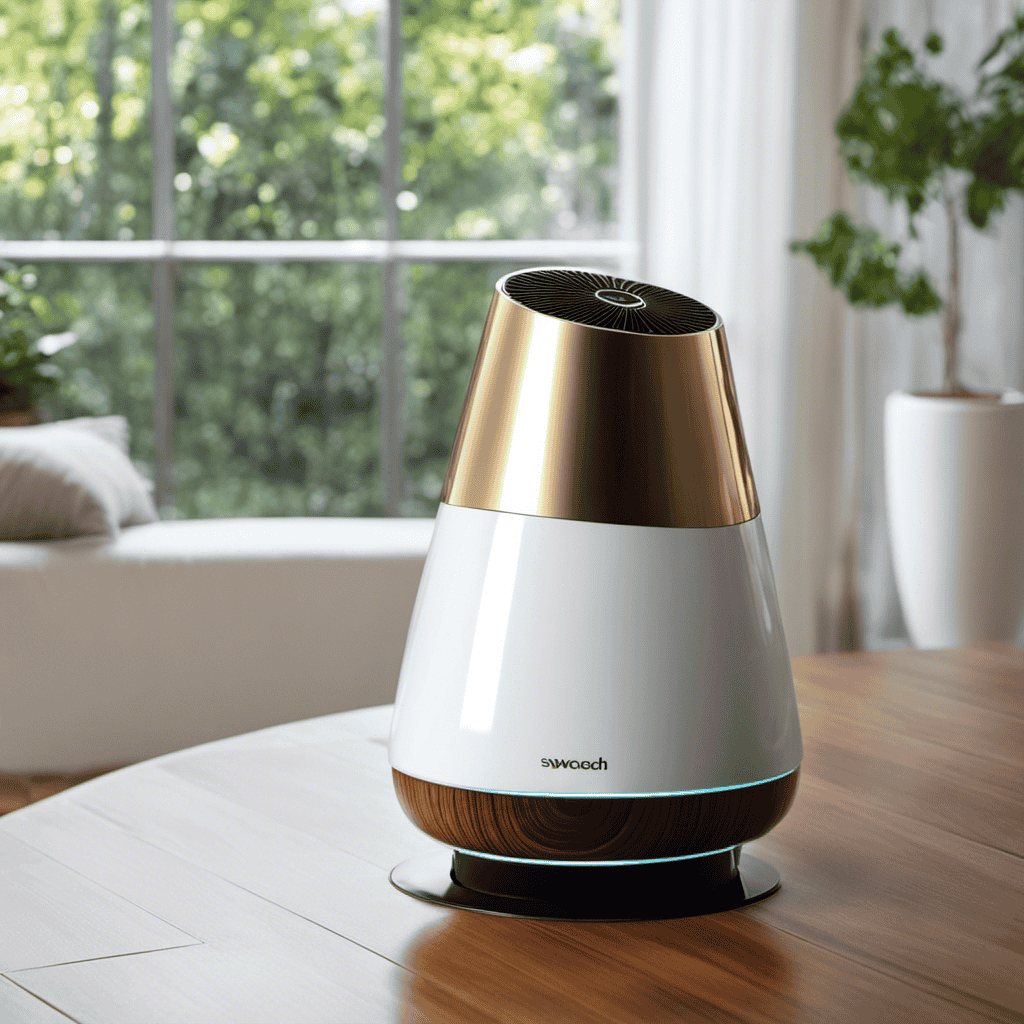
 Types of Air Purifiers4 months ago
Types of Air Purifiers4 months agoWhat Is an Air Purifier
-
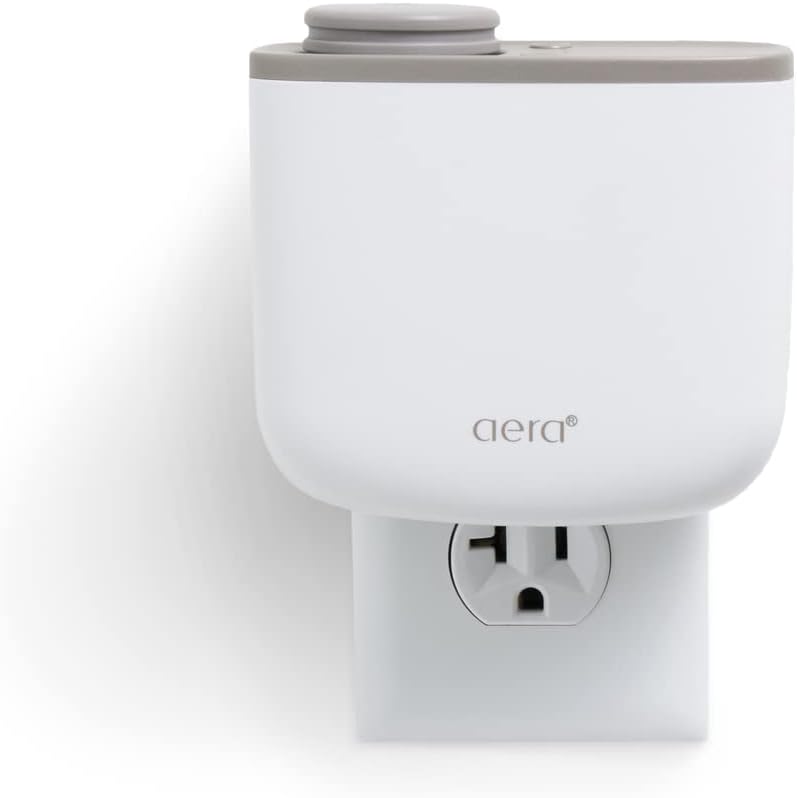
 Vetted2 months ago
Vetted2 months agoAera Mini Review: Smart Home Fragrance Diffuser With Hypoallergenic Scent Technology (2023)
-
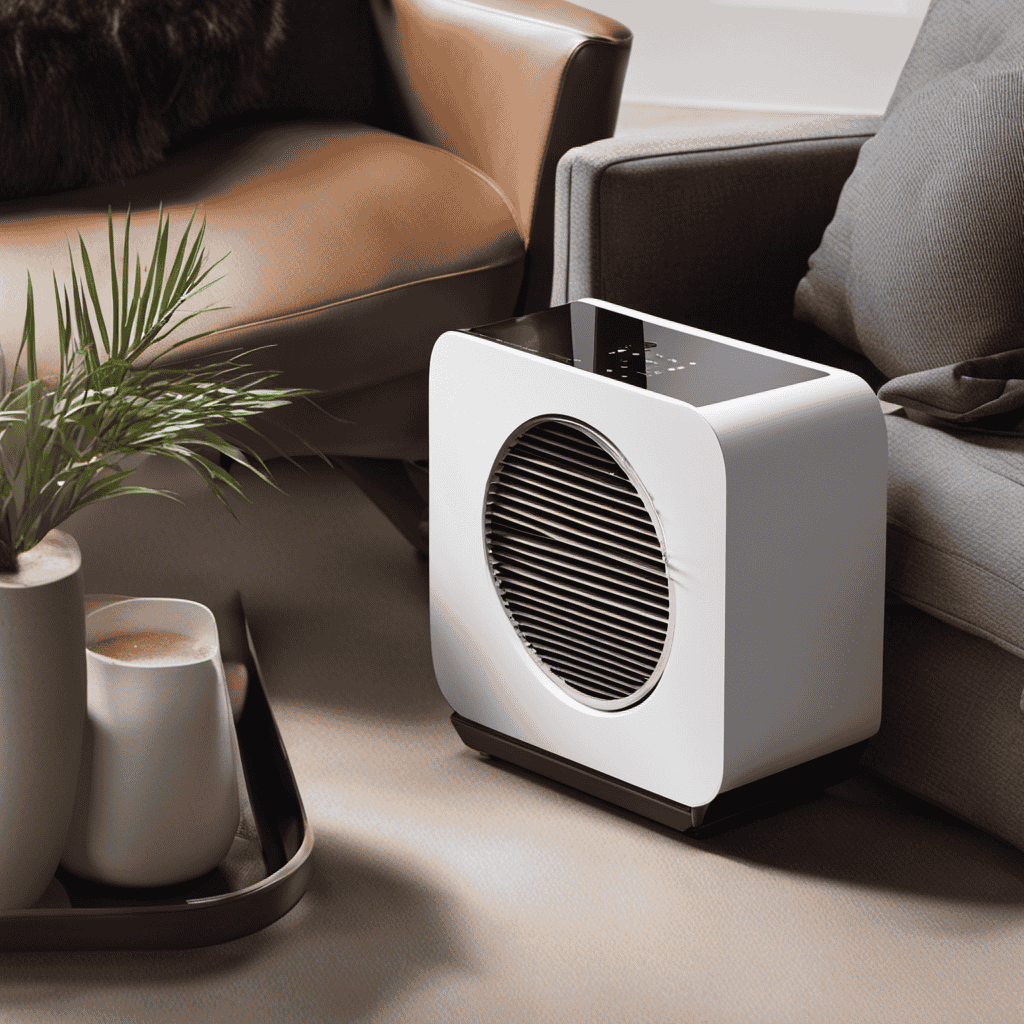
 Air Purifier Guides3 months ago
Air Purifier Guides3 months agoHow to Reset Filter on Miko Air Purifier
-
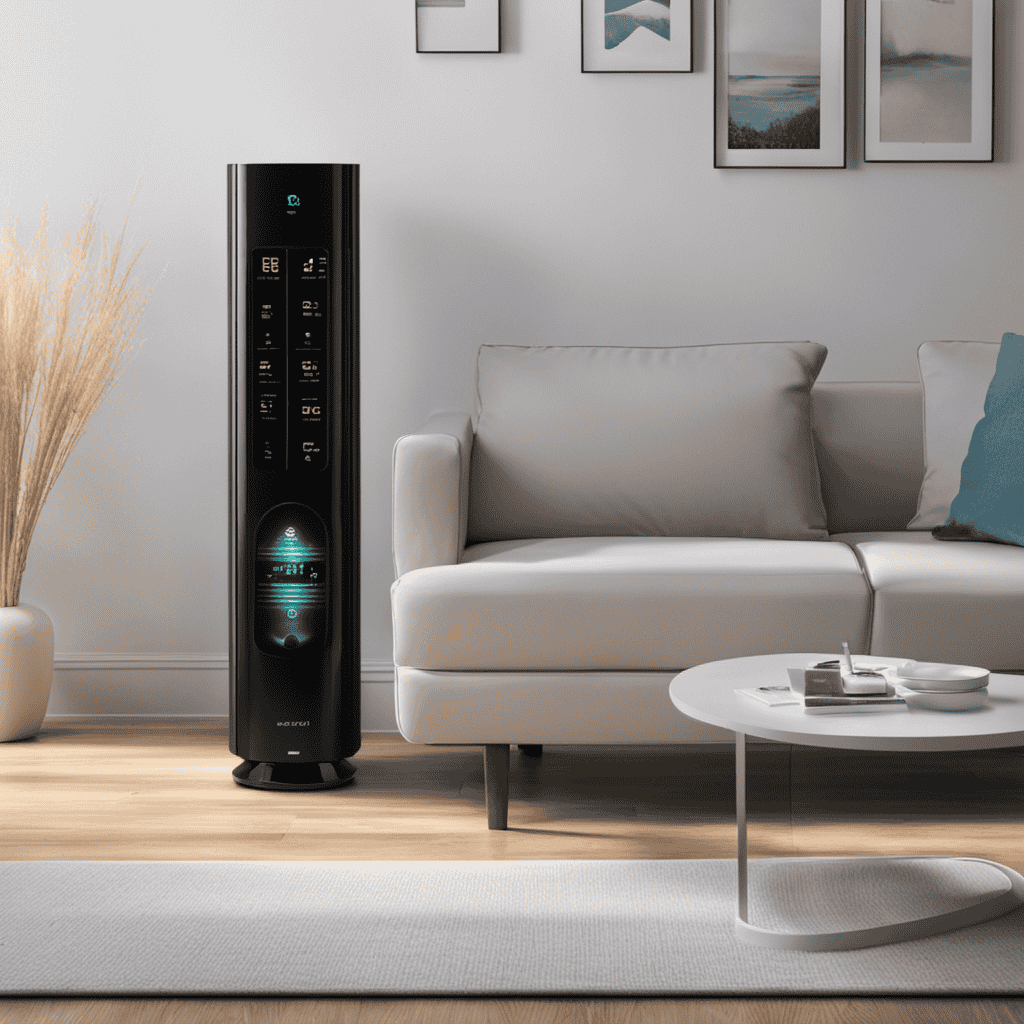
 FAQs - Advanced Queries1 week ago
FAQs - Advanced Queries1 week agoWhat Do the Numbers on My Air Purifier Mean
-
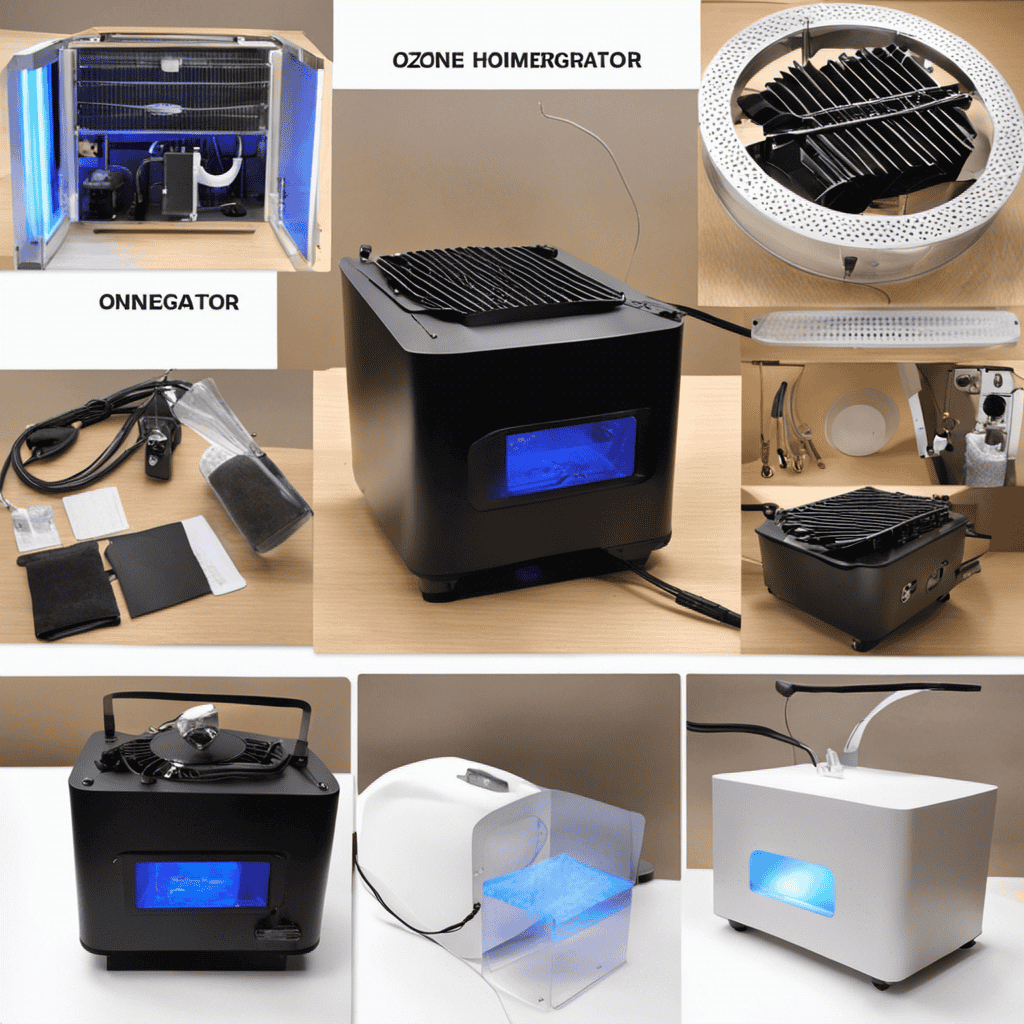
 Air Purifier Guides2 weeks ago
Air Purifier Guides2 weeks agoHow to Make a Homemade Ozone Generator (Air Purifier
-
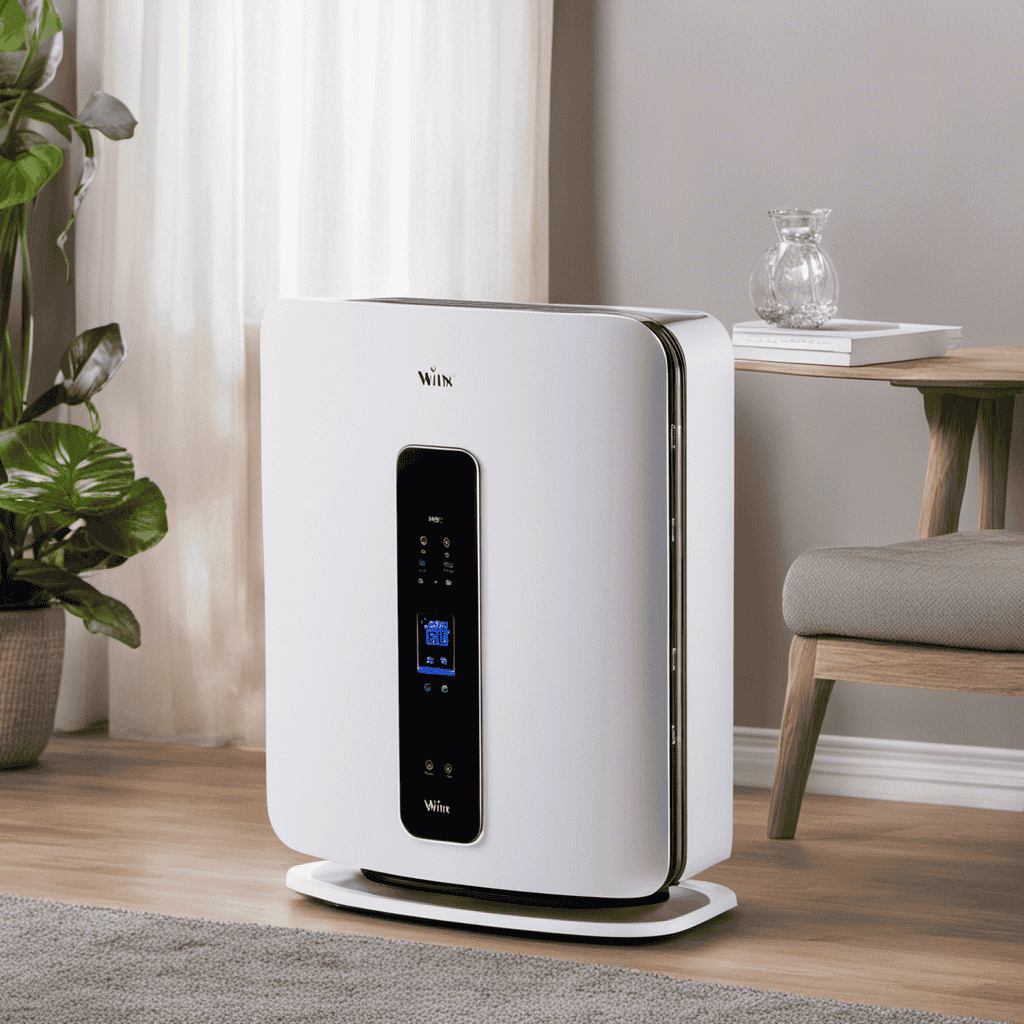
 Maintenance and Tips5 months ago
Maintenance and Tips5 months agoHow to Reset Filter Light on Winix Plasmawave Air Purifier
-
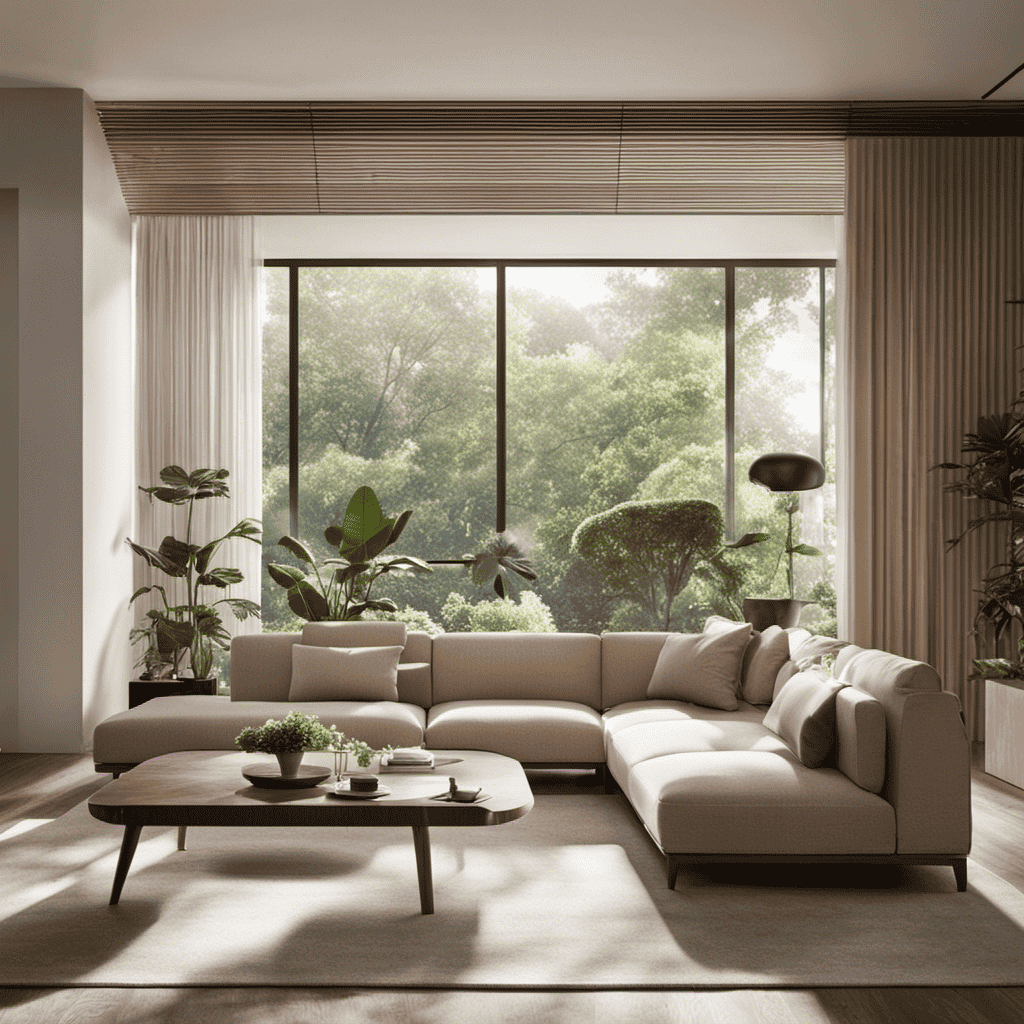
 FAQs - Advanced Queries5 months ago
FAQs - Advanced Queries5 months agoWhen to Use Ionizer on Coway Air Purifier
-
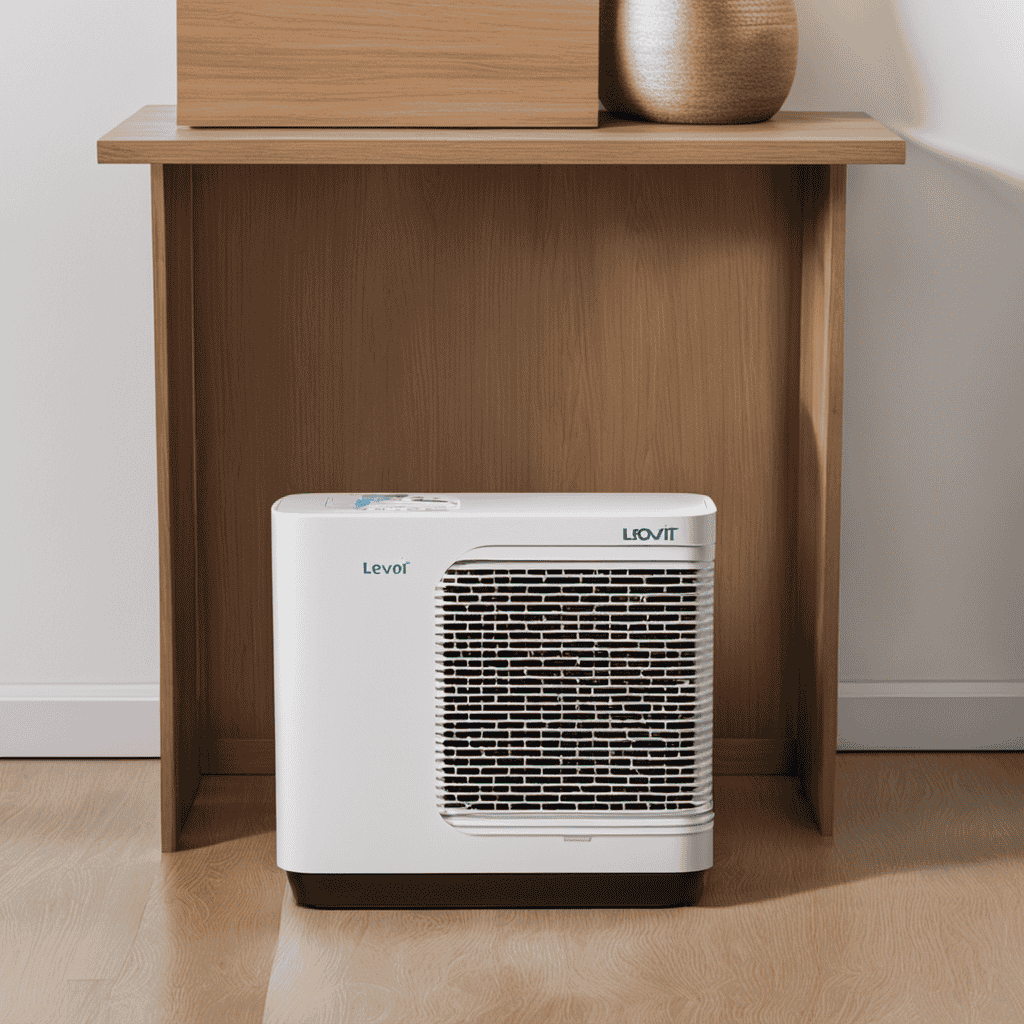
 Air Purifier Guides5 months ago
Air Purifier Guides5 months agoHow to Dispose of Air Purifier Filter Levoit






